THE FREE PRESS
Pg. 18
ADVANCING AI
Rising artificial intelligence ChatGPT impacts learning in classrooms

Pg. 20-21
TEST OPTIONAL
Students and staff discuss the effects of standardized tests becoming optional at many colleges
SAY HELLO TO XELLO
Students share their opinions about the career and life website, ‘Xello’
Pg. 22
BLUEPRINT OR AP: WHICH IS RIGHT FOR YOU
Learn about differences between Jayhawk Blueprint courses and
Issue 4 | April 13, 2023 | Edition 26
Photo by: Keat Hockenbury
CONTENTS
Pg. 6-7 Encore Lives On This year marks the 25th anniversary of Encore
STAFF LIST
EDITORS-IN-CHIEF
Allison Mayhew
Natasha Torkzaban
MANAGING EDITORS
Alicia Narum
Lilly Wall
COPY EDITOR
Stella Mosier
DESIGN EDITOR
Evan White
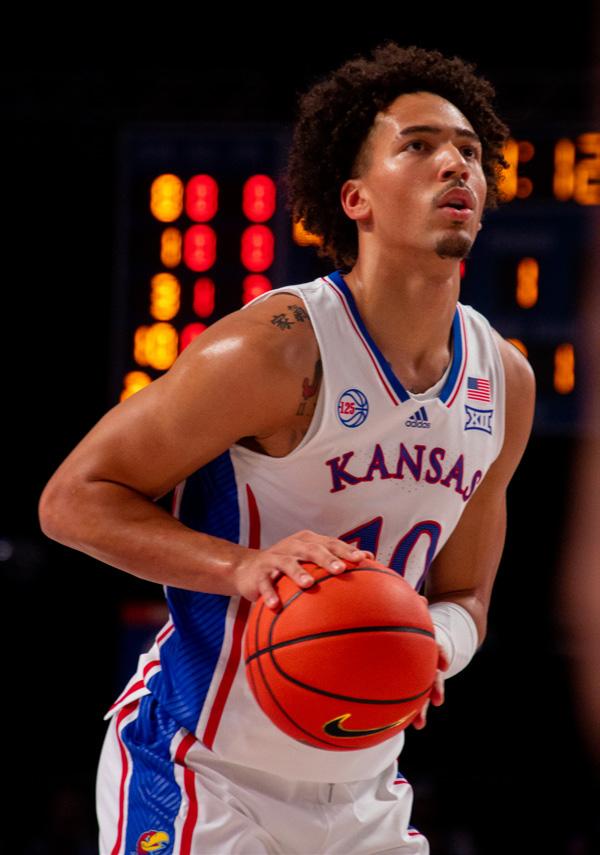
ASST. DESIGN EDITOR
Sarah Masterson
PHOTO EDITOR
Lady Ortega-Perez
ASST. PHOTO EDITOR
Mallory Thompson
SOCIAL MEDIA EDITOR
Maya Lee
ASST. SOCIAL MEDIA EDITOR
Dru White
SPORTS EDITOR
Grey Heiman
REPORTERS
Arianna Waller
Becky Coston
Conrad Hill
Evie Chancy
Emi Stone
Emma Wiley
Lauren Tao
Maeve Nichols
Maura Langland
Nick Sprecker
Phoebe Morris
Thomas Patton
Tommy Taylor
DESIGNERS
Amy Bontrager
Katie Campbell
Lauren Tao
Lola Cloud
Mylie Brillhart
Maile Hickman
Raelynn Keefer
Viviana Riffel
PHOTOGRAPHERS
Amelia Wiles
Ashanti Riccardo
Chloe Cook
Eleanor Roust
Elinor Russo
Geneva Sabatini
Opinion
4/5- Talk Around Trans Bills
9- The Ultimate Bracket Buster
4 8
Sports
8- March Madness
16- Student Athlete Commits
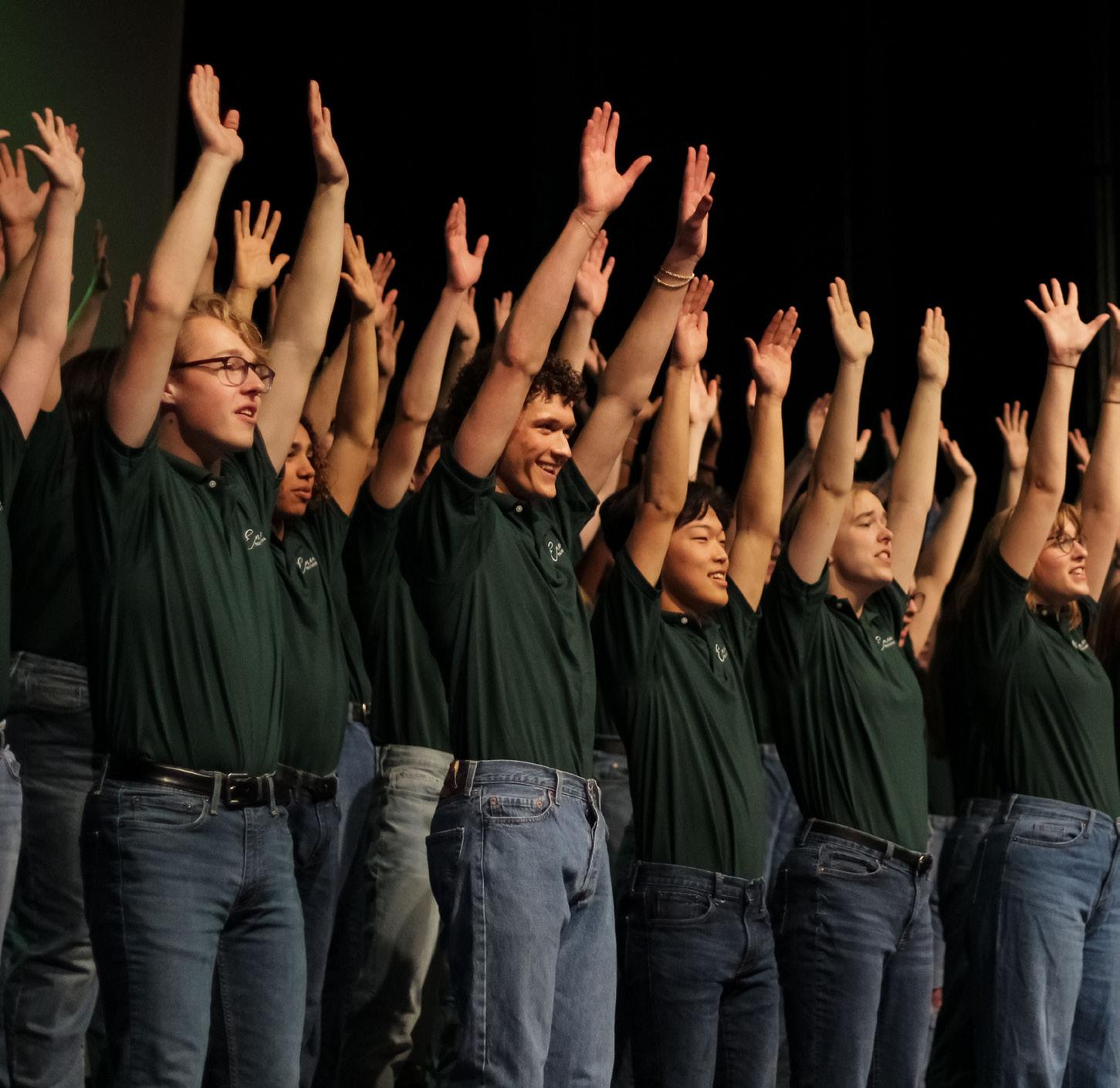
17- Compete to Repeat
Isabelle Prô
Keat Hockenbury
Maddie McIntire
Olivia Hazlett
Riley Williams
Taylor Stone
Wyatt Dodds
BUSINESS
Drew Rosenthal
Jayne Landers
Mimi Stephenson
Thomas Patton
ILLUSTRATORS
Allison Mayhew
Lady Ortega-Perez
Perry Bonner
Pg. 8 March Madness
Pg. 12-13



Briefing
Budget Cuts
Through a year full of changes, here is a summary of the USD 497 District Budget cuts
Pg. 15 School Closures
After a lengthy meeting, the USD 497 Board of Education reached a decision regarding school closures
Pg. 15 Teachers
Quitting
Teachers are leaving, resulting in students losing programs and teachers
Socials Mission Statement
Curious Free State journalists will amplify voices, gather superior sources and tell pivotal stories of our community in a visually creative way in order to serve our audience and foster quality scholastic journalism in Lawrence, Kansas.

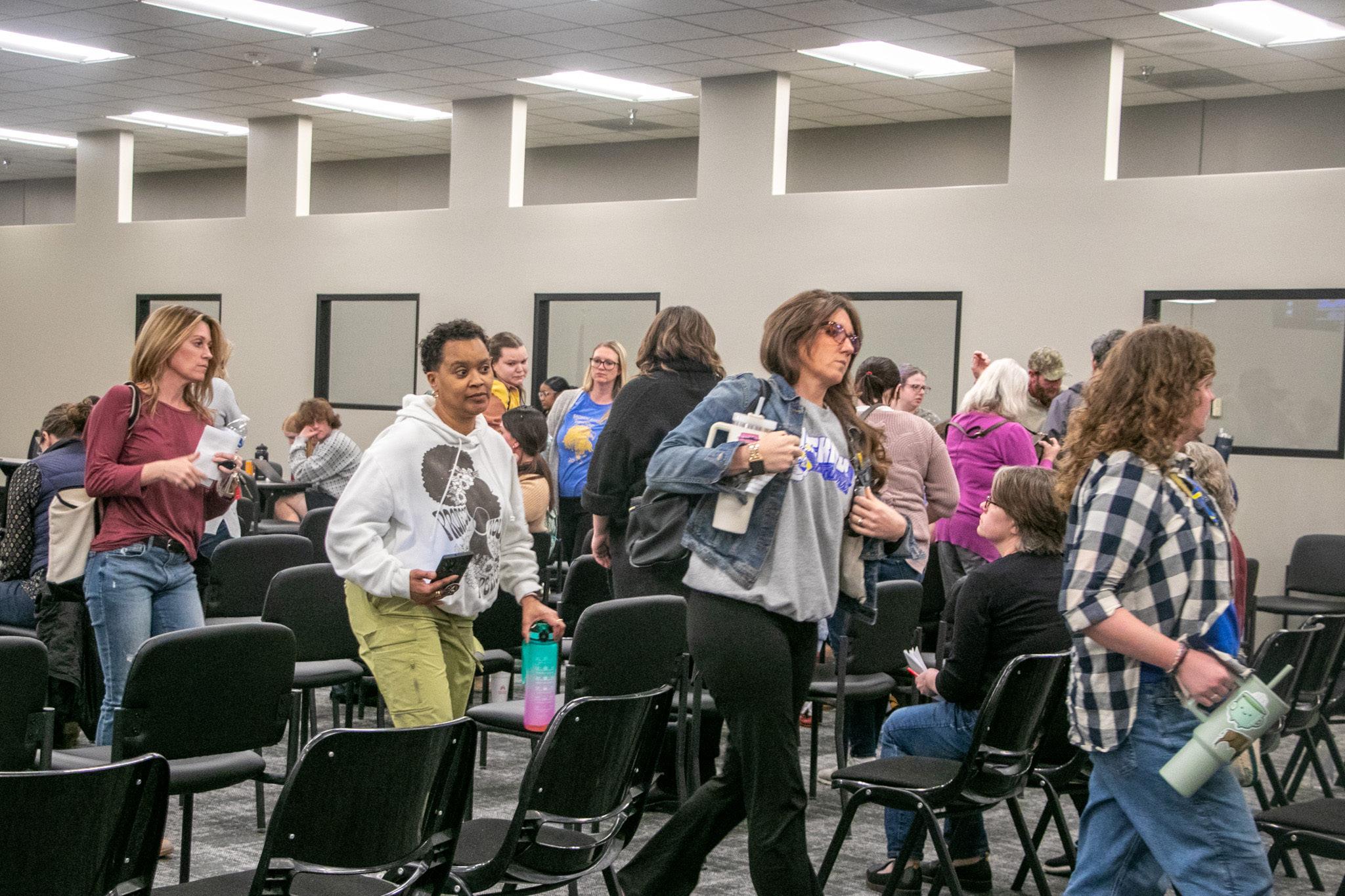


Features A&E Package News Photos Games 14 11 18 12 30 32 6- Encore Lives On 7- Sing to State 10/11- New Performances 14- Teachers Quitting 27- Smarties in STEM 26- Student Successes 24- Lana Del Rey’s Did you know that there’s a tunnel under Ocean Blvd Review 30/31- Photo Gallery 18/19- Advancing AI 12/13- USD 497 District Budget Cut Recap 15- School Closures 28- The Great Burger Heist 29- Reports of Vandalism of Local Businesses 20- Test Optional 21- Say Hello to Xello 22/23- Blueprint or AP: Which is Right For You? 25- Carlos’ Cuts 32- Coffee Shop Bracket FSFREEPRESSONLINE.COM FOR BREAKING NEWS AND MORE CONTENT VISIT OUR WEBSITE!
@fsjournalism 4700 Overland Dr, Lawrence , KS 66049 Free Press/April 2023 Issue
 STUDENT POSES with a transgender flag during a student-organized walkout. Students from across the district walked out from class on March 28 to voice their opinions on the introduction of anti-trans bills in Kansas.
STUDENT POSES with a transgender flag during a student-organized walkout. Students from across the district walked out from class on March 28 to voice their opinions on the introduction of anti-trans bills in Kansas.
The Free Press - Editorial 4
Photo By Mallory Thompson
TALK AROUND TRANS BILLS
State legislation puts adolescents at risk by introducing anti-transgender bills
For many students, school sports are a central source of stability and a safe space to feel valued among peers.
On April 5, Kansas legislature voted to override Gov. Laura Kelly’s veto of House Bill 2238, which requires that female athletic teams only include members who are biologically female. This decision will directly harm students’ mental health, causing terminal drawbacks to self-esteem and emotional security in daily life.
State legislature has failed to consider how this bill will permanently tarnish transgender lives physically, mentally and socially with no public policy benefits.
As a female student-athlete who has played numerous sports at a competitive level my whole life, I have not seen anyone concerned with the teammates that stand beside each other — aside from elected officials themselves.
According to the National Athletic Trainer’s Association, youth who involve themselves in school sports are less stressed, maintain lower depression symptoms and have higher self-esteem and confidence.
Bill Faflick, executive director of the Kansas State High Schools Activities Association, said these legislative decisions will largely impact student mental health as some students may feel isolated or abandoned for simply desiring to participate in an activity they enjoy.
To make it clear: the enactment of this bill will not improve test scores or enhance education. All it will do is fabricate harmful rhetoric toward transgender students who will experience further social isolation because of these damaging legislative decisions.
Although Kelly vetoed the bill on March 17 for a third year in a row, taking a needed stand against anti-trans legislation, the Kansas Legislature voted to override Kelly’s veto on April 5.
Story by Lilly Wall
When considering this decision, Republican house leaders claimed the Fairness in Women’s Sports act will protect the rights of female athletes and their opportunities to athletic awards, opportunities and scholarships.
Legislation is cherry-picking whose rights they aim to protect, and are arguing to solve a non-existent problem. Rarely do you hear about a student who has lost a title or trophy because of the participation of a trans athlete.
The true destructive loss would be straight from the transgender youth community itself. All students deserve to feel safe and like they belong, regardless of their identity.
Growing up as an athlete, my peers used sports as an avenue to express their true selves. With sports, I have found self-identity by finding my people, gaining leadership skills and learning valuable life lessons. Taking away these rights from transgender youth is blatant discrimination and will deprive children of the opportunity everyone deserves — to participate and discover themselves through sports.
Furthermore, the enactment of HB 2238 will not only create social isolation for kids on the field and in the gym but also in the classroom. The actions taken by HB 2238 will send a malignant narrative to transgender students that they are not welcomed or accepted for who they truly are.
Therefore, legislators cannot expect students to feel safe, respected and cared for in the classroom after their right to participate in athletics as their true selves are mindlessly stripped away.
Not only will this bill affect teenagers in Kansas, but it sends a shattering implication to all teenagers around the country — that legislators wrongfully voted against the rights of transgender teens to participate, learn and succeed in the same manner as their peers around them.
Motion passed 84-40 in House
Motion passed 28-12 in Senate
“Denying a group of students eligibility deprives them of the opportunity to learn and grow through participation,” Faflick said.
5
Design by Mylie Brillhart | Photos by Mallory Thompson
ENCORE LIVES ON
This year marks the 25th anniversary of Encore
On March 23, 24 and 25, upperclassmen choir students performed the 25th annual Encore. With help from choir teachers Joshua East and Olivia Henning, the Lawrence community looked forward to seeing these students perform.
Encore showcases students’ abilities to put together ensemble groups on their own, and the choir teachers get the pleasure of watching each kid grow throughout the years.
Story by Phoebe Morris
Encore has been showcasing student talent for the past 25 years at Free State. These singers dedicate time not just to a show, but to a tradition. Their success is widely celebrated across the choral department, especially for the seniors who are graduating after four years of involvement.
“The goal is to just have fun and show the school why the arts are so important,” Rivera said. ”This is our moment to inspire people by what we do.”
Choir hasn’t seen the same Encore as it was before the pandemic; it has been challenging to bring back audience members ever since people started staying home more often.
“We’re just trying to get back up to where we were pre-COVID, so we can spread our music to all the people who see Encore,” senior Grace Malin said.
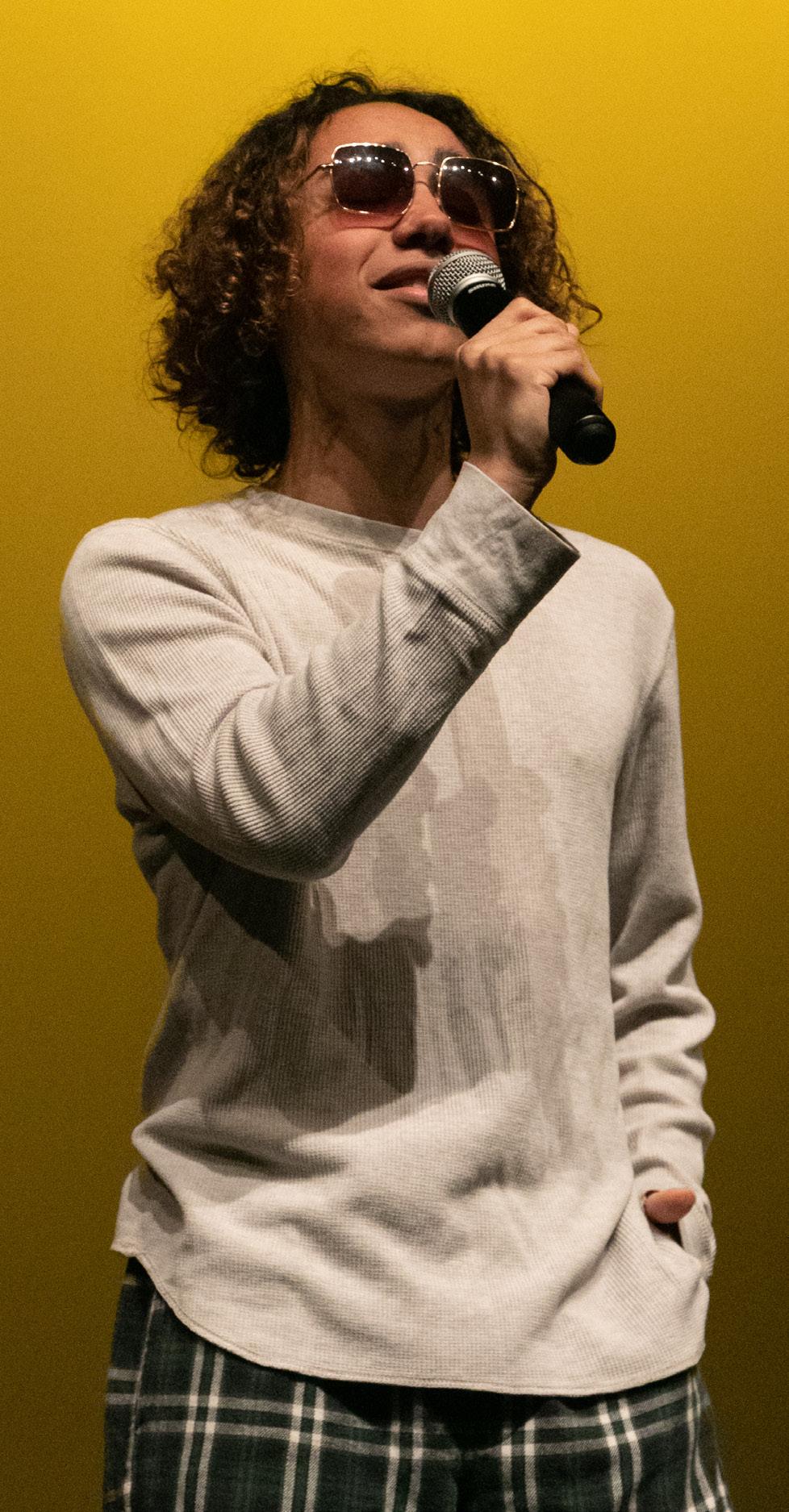
Additionally, due to the pandemic, seniors have the additional responsibility of reintroducing traditional standards to the juniors.
“Seniors learn a lot from the previous year’s process and they are able to lead the juniors through the year,” Henning said.
That being said, some singers have grown up watching Encore since middle school. Becoming one of the performers was a surreal experience for some performers.
“I used to watch these people, but now it’s me, and it brings this crazy feeling of accomplishment,” junior Ava Rivera said.
The Free Press - Arts and Entertainment 6
Hand in the air, senior Gemma Waldron poses during “Rumor Has It/Someone Like You” by the Glee Cast. Encore was held March 23-25 at 7:30pm. Photo by Eleanor Roust
“When we see kids up on stage, we remember all of the years that led up to this and are just floored by how much they’ve grown and all the skills they’ve developed,” East said.
SINGING TO STATE
Chamber choir performs with combined All-State choir for annual state performance in Wichita
After months of preparation, the chamber choir performed for the Kansas Music Educators Association at Wichita with the entire All-State choir on Feb. 25.
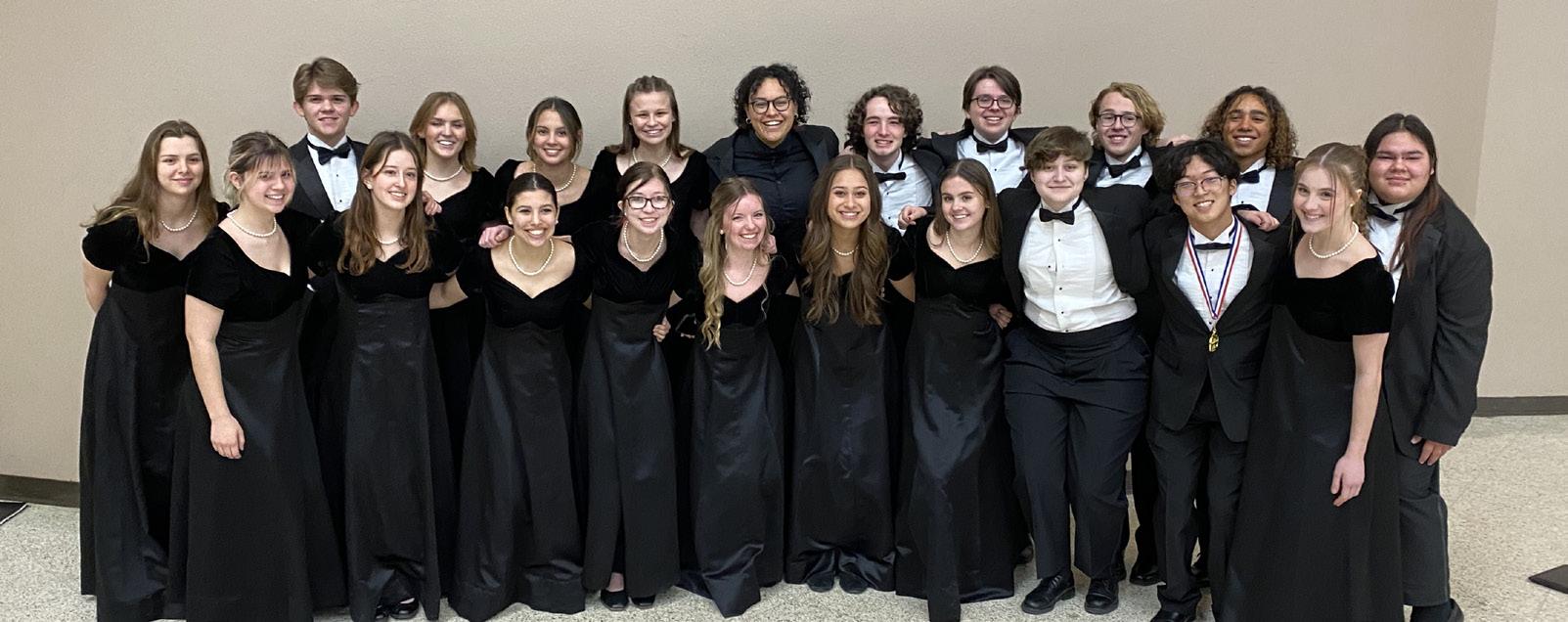
Chamber choir first started practicing early in august because three of the songs they used in the KMEA performances were the songs students had to use to audition to get into All-State Choir.
“They’ve been working on those three since August and they found out in December if they made state or not, and then in January, we gave them the music for state and they prepared all on their own,” co-choir director Olivia Henning said.
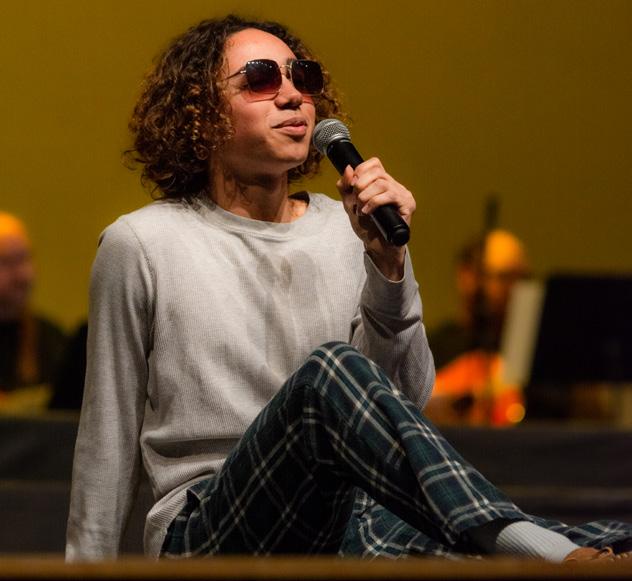
They performed many pieces including “Lamentations of Jeremiah”, “All of You”, “Butterfly,” “Mainacht.” One of the songs was even written by one of the clinicians at the KMEA, Z. Randall Stroope.
“There was a really wide variety: from poems to coronation music, like Lamentations of Jeremiah. So it was a very
Story by Conrad Hill
diverse set of music that we did overall,” senior Jake Chun said.
In terms of their performance of those songs, they had a striking sound. According to Henning, there were 250 singers in each performance at once.
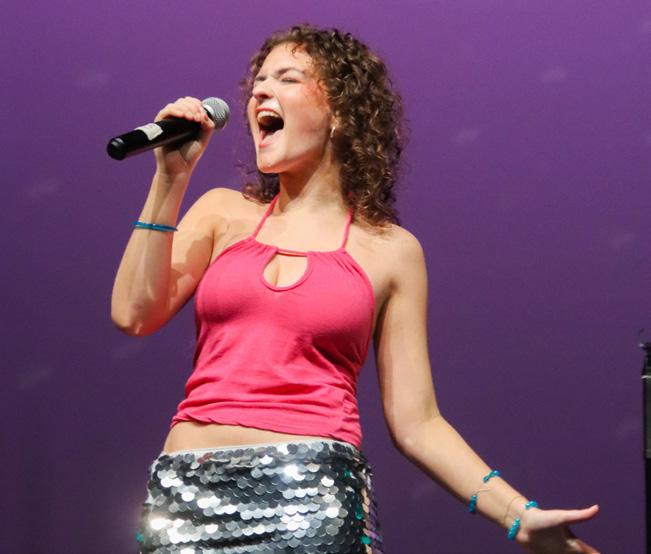
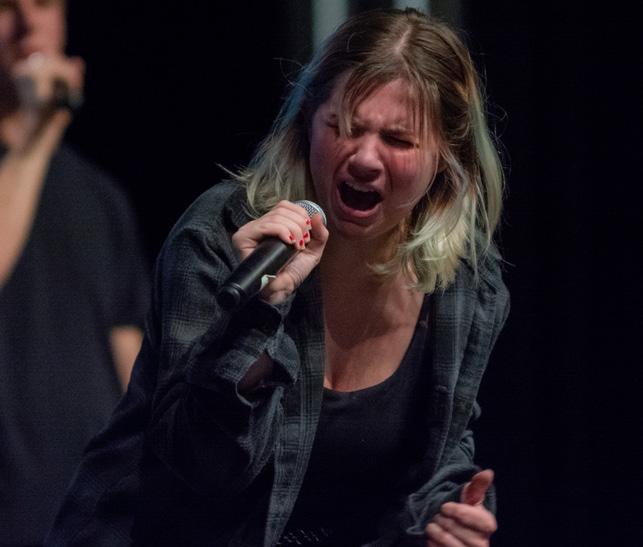
“It was an extremely powerful sound and a very big space,” Chun said. “I really enjoyed the music we did so overall, it was probably one of the best choir experiences I’ve ever had.”
All-State choir was very successful with the sound, passion and overall love for music. Junior Luca Osborn claimed they are looking forward to doing just as good in the future.
“It’s really cool to see all the people that are passionate about choir together,” Osborn said.
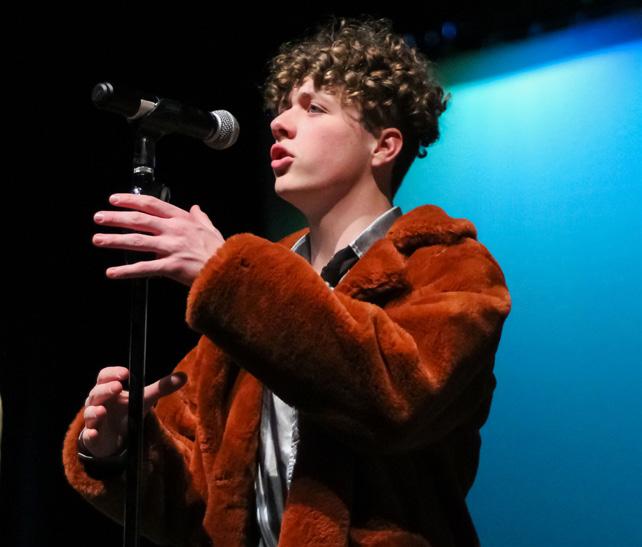
7
Design by Amy Bontrager | Photos by Isabelle Pro, Eleanor Roust, Chloe Cook, Mallory Thompson
During “The Lazy Song” by Bruno Mars, senior Michael Bido sings out to the audience. Students will spend a lot of time preparing for the auditions to get their acts into Encore. “The rehearsal process before auditions was stressful, but it was so fun to plan out our ideas and collaborate with one another,” Bido said. Photo by Chloe Cook
Senior Lily Otter performs her solo in the song “Bottom of the River” by Delta Rae during Encore. “I was having a lot of fun it’s a very powerful song to sing and each night the audience got more and more into it and that gave me a lot of confidence,” Otter said. Photo by Chloe Cook
Senior Perry Bonner hits a note during her rendition of “Emotions.” Bonner has been a member of the choir for all four years of high school. Her favorite part was “the unforgettable memories and amazing people,” Bonner said. Photo by Isabelle Pro
First Junior Levi Bates performs “Rich Girl” with his friends. Bates has been part of the choir program for all three years he has been at Free State and his favorite part of Encore was “getting to create something great” with the people he loves being around. Photo by Geneva Sabatini
Arms around each other, the Free State Chamber Singers smiles for a photo. They participated in the Kansas Music Educators Association All-State Choir held at the Century II Performing Arts & Convention Center. Photo Contributed by Joshua East
MARCH MADNESS
What makes March Madness so special?
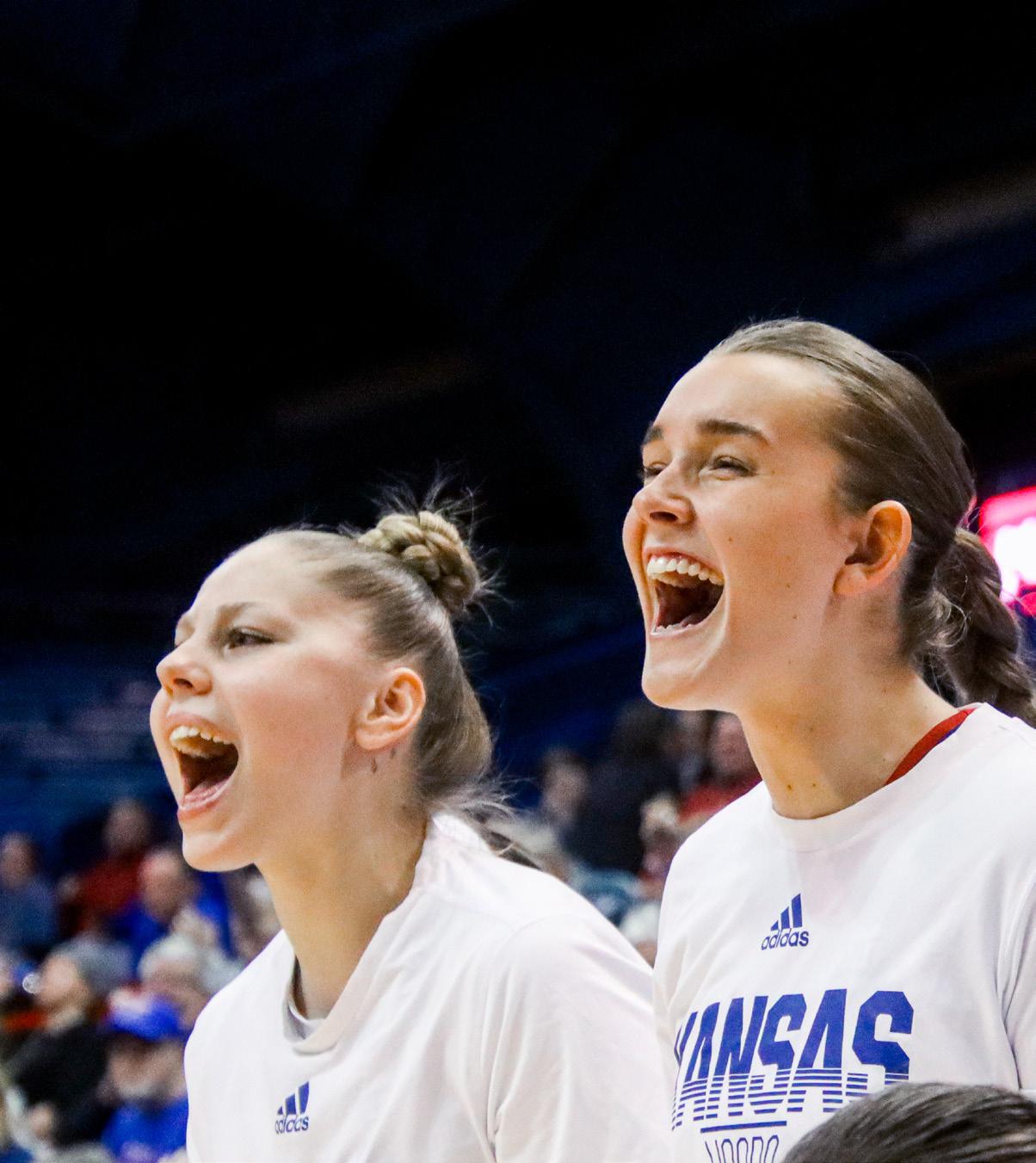
THE ULTIMATE
Story by Grey Heiman
The NCAA’s March Madness tournament is always a major event in the world of sports. With 64 Division I schools out of 324 competing, only one team becomes the national champion. This leads to highly competitive and dramatic games for fans to enjoy.
Former University of Kansas basketball star, Sherron Collins, knows from firsthand experience the sheer competitiveness that comes with playing in the March Madness tournament. Collins was a key member of the KU team that won the 2008 National Championship; he explained what it was like winning it all.
March Madness is a roller coaster of emotions, with highs and lows. One of the aspects of the tournament that makes it so remarkable is the upsets. Neutral fans love to see an underdog story like a 16 seed beating a 1 seed.
“You feel good for the 16 seed,” junior Jackson Lickert said. “Knowing that they worked hard all season and then coming into the game where they’re heavily favored to lose and pulling it out. You just kind of feel happy for them.”
Another major draw for fans is the camaraderie that comes with rooting for a team.
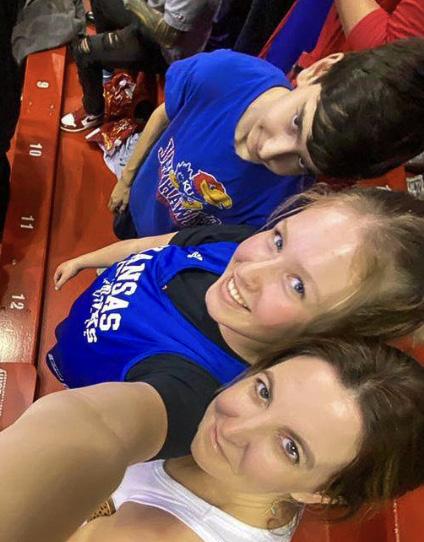

“It’s just a great time to come together and watch some good basketball and be fans together,” junior Logan Hannah said.
Like other major sporting events such as the Super Bowl and the World Cup, March Madness is a special time that unites friends and family, whether it be rooting for their favorite team or just enjoying competitive basketball.
The Free Press - Feature 8
“It’s the best feeling. To this day, I’ve played professionally, I played in the NBA and I played overseas. Kansas was the best point in my life basketball wise,” Collins said. “You fight all year just to get to that one game… so I will say winning it all was one of the biggest accomplishments of my life.”
Junior Elsa Carillo takes a selfie in the stands at Allen Fieldhouse. On March 18, the University of Kansas men’s basketball team fell 71-72 to Arkansas to end their 2023 NCAA tournament run. Photo submitted by Elsa Carillo.
ULTIMATE BRACKET BUSTER
The March Madness bracket phenomenon began in 1977, and has been a fascinating staple in the sports world ever since. What goes into a “perfect bracket?”
Around 60 million Americans fill out their March Madness brackets annually, many of them joining bracket competitions. Whether it’s serious or for fun, everyone gives their best shot at predicting as many games as they can.
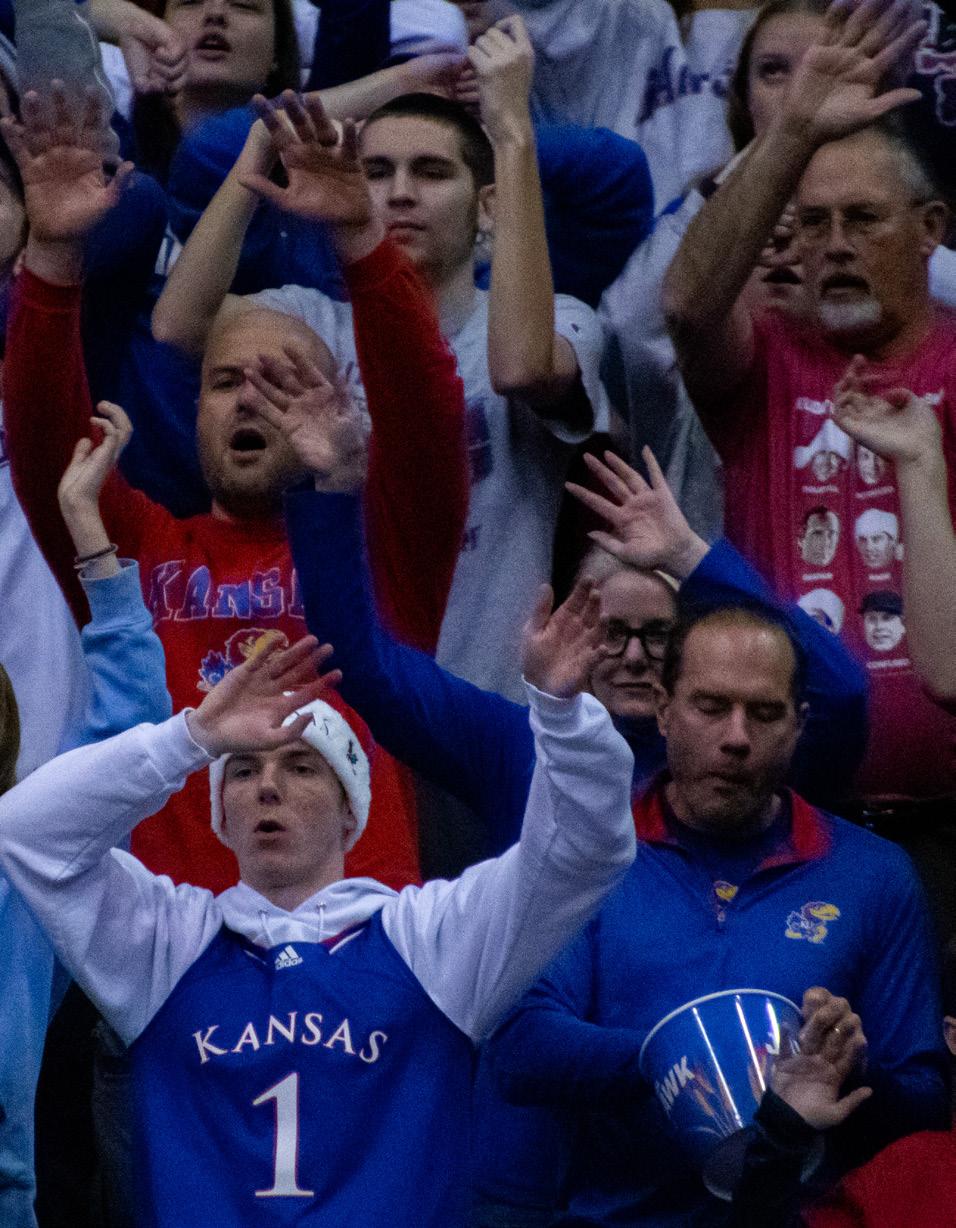
Want a perfect bracket? That’s a pretty tall order; no one has ever been able to pull it off. The math suggests that it’s practically impossible.
The odds come out to be around one in 9,223,372,036,854,775,80 or 9.2 quintillion. It is hard to grasp such a number — 9.2 quintillion seconds would be about 292 billion years. ESPN suggests that even if you have a fair amount of basketball knowledge, your odds lie around one in 120 billion.
Even though a perfect bracket isn’t likely, there are still ways to win big in bracket competitions. You just have to rack up the most points in your pool.
When trying for a good March Madness bracket, a few things come into play: analytics, experience, upsets and most importantly, a lot of luck.
First things first: the best teams are ranked highly for a reason, especially one and two seeds. Those teams simply have the best resume with the most talent. Since 1979, one seeds have accounted for 40% of total Final Four appearances. Powerhouse teams are likely to stick around for a bit.
From there, analytics can help convince you which teams to take far. Statistician Ken Pomeroy’s “KenPom” rankings are a great tool for this.
Story by Nick Sprecker
Look not only for teams with good offensive efficiency, but great defensive teams. Defense is reliable and can turn into quick offense on the other end.
An experienced team with a good coach is a recipe for success. When looking at previous Final Four teams from the past ten years, almost all of them had an average roster experience around at least 2.5 years. When paired with a proven, seasoned coach, that team is likely to handle adversity much better.
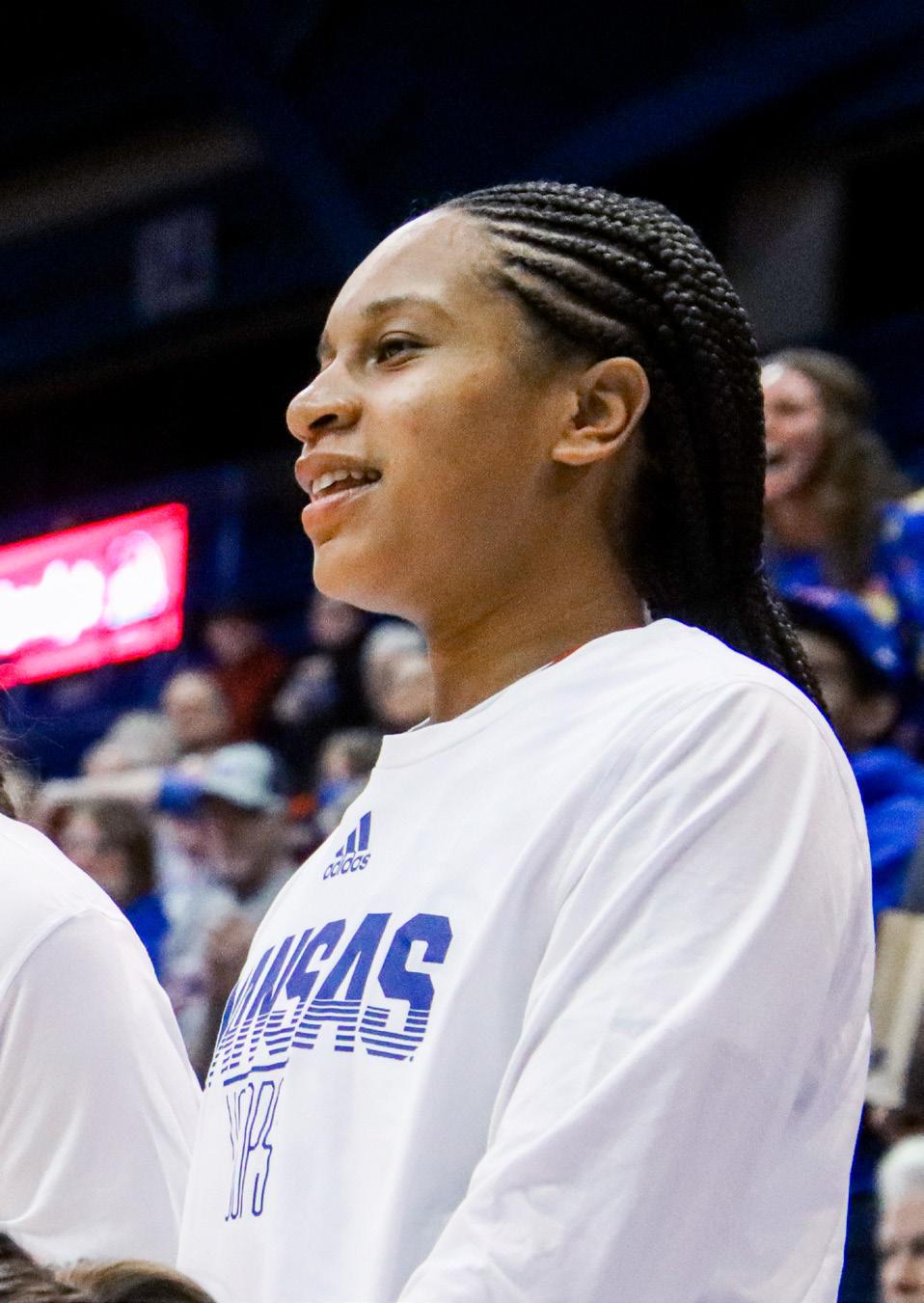
March Madness has earned its name. The annual average for upsets lies around 12.4. Predicting an upset is an awesome feeling, but going overboard on them may just ruin your bracket. A more common and exciting upset are the 12 vs. 5 seed games.
Historically, 5 seeds boast only a 64% win rate when facing a 12 seed — that’s significantly lower than other upset chances with a similar seed pairing. The 12 seeds in the tournament are typically the strongest mid-major teams who face off against weaker power-5 teams in the first round. If an upset looks intriguing, trust your gut. They are high risk, but have large upside and can make your bracket a winning one.
Regardless of how passionate you are, don’t sweat your bracket. The majority of victors win bragging rights and perhaps a little cash; however, if you happen to strike a perfect bracket, make sure to let Warren Buffett know. The businessman will pay $1 billion to anyone that can predict every game correctly.
9 Design by Evan White | Photos by Isabelle Pro
University of Kansas fans ‘Wave the Wheat’ in the stands of Allen Fieldhouse. For decades, fans sway their arms back and forth in the air to show Jayhawk pride. Photo by Isabelle Pro
University of Kansas players cheer on their teammates from the sidelines. On April 1, the Kansas women’s Jayhawks defeated Columbia 66-59 to snag the WNIT Championship title. Photo by Isabelle Pro
NEW PERFORMANCES
The theater department introduces new director Bryce Jones for the spring show, Murder on the Orient Express Story
by Maura Langlandd
On March 3 and 4, the theater department put on “Murder on the Orient Express” with new director Bryce Jones. This semester, Jones made the transition from assistant director to head of the theater department and lead director.
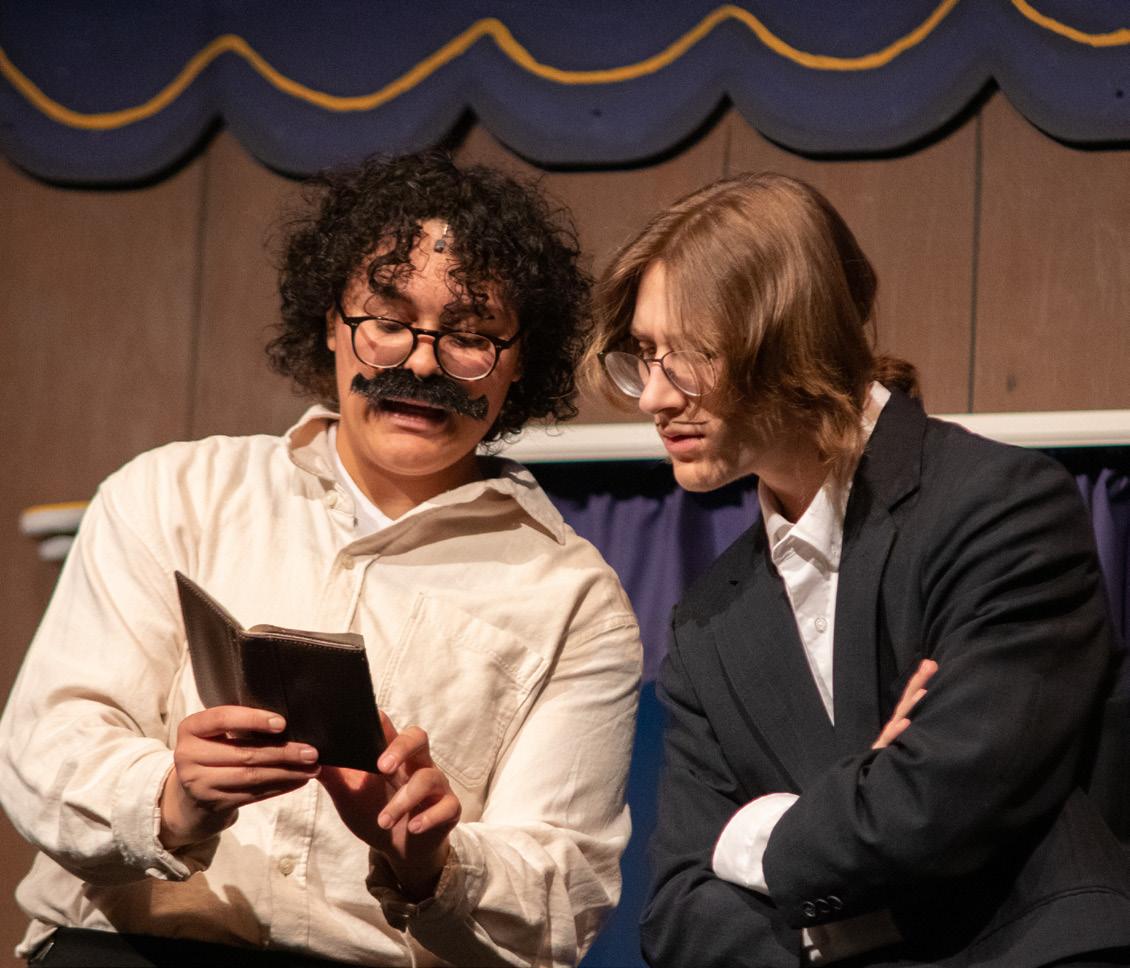


For this show, Jones focused on letting his students express themselves through all of the different mediums of theater like acting and set design.
Jone’s new approach for the spring show was appreciated by his students. Junior Lindsey Landholm was excited for what his new direction brought, including a new cartoon-like approach to the play.
“He [had] a very specific vision for it, and I think it’s really fun,” Landholm said.
Landholm is a member of the hair and makeup team, and has been a member of the theater department for three years. Landholm said besides the experience of working on shows, the best part of theater according to Landholm is the community.
“It’s a weird amalgamation of people that are in it because there’s stereotypical theater kids, like me, but then there’s also people that you would never expect to try it,” Landholm said.
The positive environment is another element Jones brought to the theater department; additionally, he let students have more of a say during their auditions for the show.
The Free Press - Feature 10
After discovering a murder on the Orient Express, Monsieur Bouc, played by sophomore Cooper-Atlas Hefty, calls for help. Although being involved since fifth grade, their theater experience was brought to a halt during the pandemic. “I missed the feeling of theater and how fun it was,” Hefty said. Photo by Eleanor Roust
“[My goal] is for everybody to feel as though they can put a piece of themselves on display for everybody,” Jones said.
Working to find the murderer, Hercule Poirot, played by senior Soledad Edison, and Monsieur Bouc, played by sophomore Cooper-Atlas Hefty, review clues from the case. Although opening night was stressful for many, Hefty found that the audience’s engagement made everything easier. “[Hearing] the applause at the end every time when I’d go out gave me a lot of adrenaline and kept me going,” Hefty said. “It felt really good and it made me proud of the time that I put into the production.” Photo by Eleanor Roust
“I really liked Mr. Jones’s process of partnership,” junior Ava Ayala said.“It was cool getting to choose our own selections.”
Ayala acted in the show as Princess Dragomiroff, and according to her, the most demanding part of theater is the time commitment.
Seeing the theater productions is just one way to support the theater department. Jones said another way is to consider getting involved in any way possible.
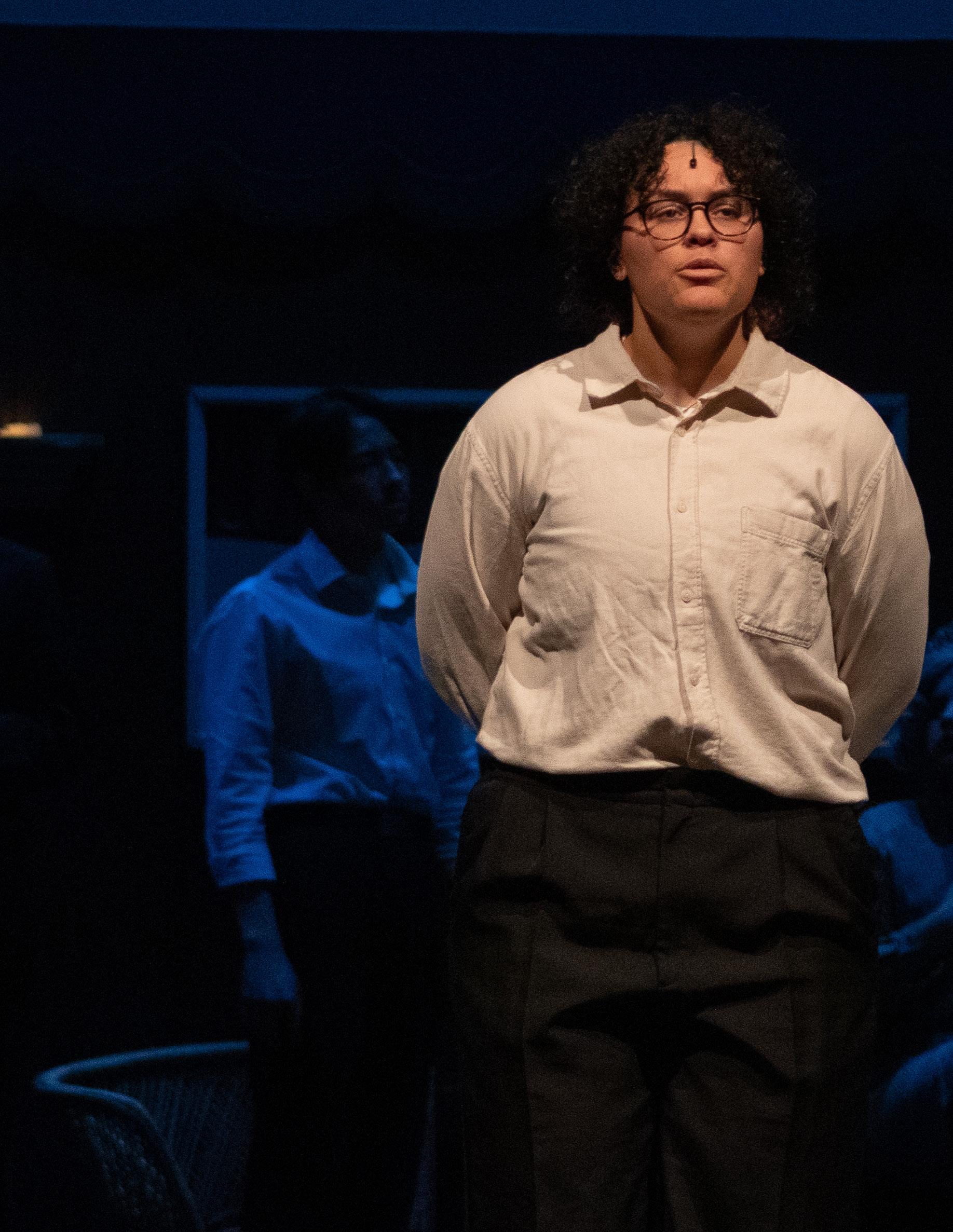
“If you’d like to create anything really, whether that’s tangible or digital, there are spaces to get involved,” Jones said.
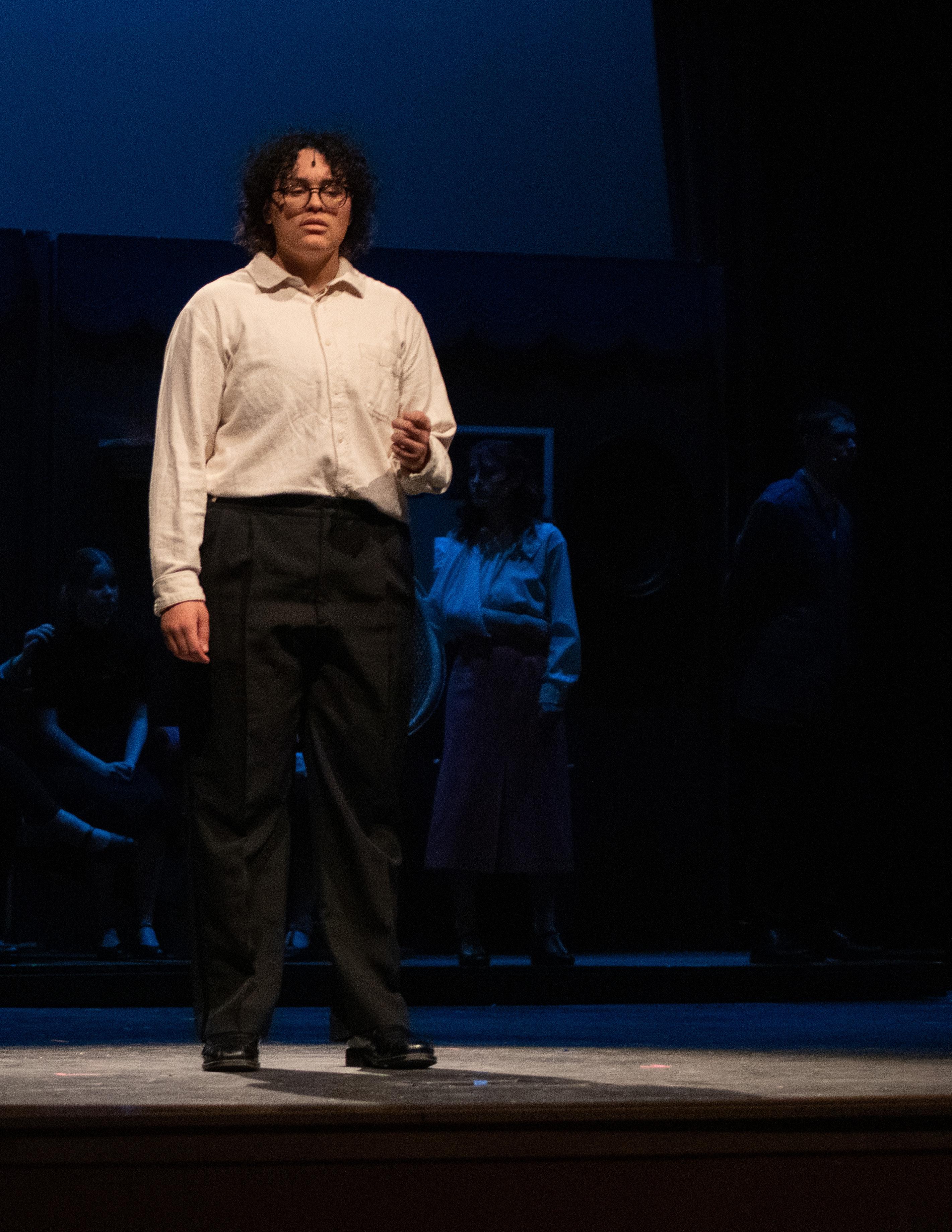
11
Design by Lola Cloud | Photos by Eleanor Roust
“We will be at the school from the morning until late, but it’s worth it in the end,” Ayala said.
BRIEFING BUDGET CUTS
Through a year full of changes, here is a summary of the USD 497 District Budget cuts
Collected by Natasha Torkzaban
Teachers juggle increased class sizes, pay freezes and workload
Teacher pay: Due to the USD 497 budget crisis, student programs being cut and financial woes are impacting teachers. Despite this year’s 1.8% increase in pay, budget issues have caused staff members to experience vertical pay freezes.
Staff shortage: Financial problems have also led to district-wide staff shortages, as some teachers have completely left the profession and others are drawn to districts with slightly higher pay. Without the ability to attract, or fully compensate teachers, class sizes have significantly increased because not every position is filled.
Class sizes: Increased class sizes also add additional time commitments for teachers who do not have a lot of time to spare. During the week, teachers are in charge of creating lesson plans, grading assignments, giving feedback, attending training and more. While teachers are given four hours and 15 minutes of plan period a week, many teachers find themselves working after hours, on weekends, and even holidays trying to complete their work.
COVID-19 impacts: After being online for almost two years, many teachers have noticed gaps in student’s learning. Whether it’s struggling with academic concepts or difficulties with adjusting to a high school environment, many teachers are seeing it manifest in an increase in student anxiety, depression and lack of motivation.
Story by Alicia Narum
Coaches are blindsided by facility rental fees
Confusion among sports coaches stirs discussion with the district after a new Facility Use Schedule was released in July with increased rates.
Summer participation fees: Some coaches charge athletes to participate in summer workouts or camps. For example, volleyball charges $100 to participate in summer camp, which covers two hours worth of camp, a t-shirt, insurance and adds to the scholarship fund for athletes wanting to attend but unable to pay. The new facility rental fees drafted last summer could mean the district takes a cut of those profits, which several coaches have not previously been charged for or have been charged significantly lower rates.
Impact of summer programs: Although some coaches have expressed the new fees would dampen their summer preparation, Athletic Director Jered Shaw believes that holding camps over the summer is important and didn’t think the new fee schedule would have a big impact on summer offerings.
Draft changes: This draft was updated in February with new fees that would entail approximately $15 per day usage fees, compared to the $15 per hour fees originally. It is yet to be finalized.
Story by Natsha Torkzaban
Allison Mayhew
and



Teachers are quitting Teachers are leaving, resulting in students without programs or educators.

Reasoning: Principal Amy McAnarney claimed teachers are leaving for many reasons, saying that some are going into the private sector to earn more money than their current teaching jobs.
Student impact: With the struggles of filling availability for certain teaching roles, students are left without certain opportunities, programs and clubs, and this problem is likely to continue next year. “It’s likely to be a continuing problem,” McAnarney said. “There’s not as many young people going into the field of education to be teachers. The primary reason for that is they can earn more money at otherStoryprofessions.”
by Conrad Hill
The Free Press - News 12
Teachers all over the district have been experiencing low pay and tough work environments. This is leaving numerous classroom teacherless.
Photo by Taylor Stone
Futures Planning committee proposed budget cuts
On Jan. 18, In an attempt to bridge the budget gap of $9.6 million, the USD 497 Futures Planning Committee (FPC) proposed a series of proposed cuts. Objectives: The main objectives are to achieve competitive wages for staff, allocate funds for annual cost increases and increase district cash balances.
Concerns: Families and community members expressed concern at the meetings, particularly with the way the proposals were being handled.
Story by Cici Hunter, Lilly Wall and Natasha Torkzaban
District votes to transition from Macbooks to iPads next year
The board made the decision on Jan. 23, following a difficult conversation regarding ways the school budget could be cut.
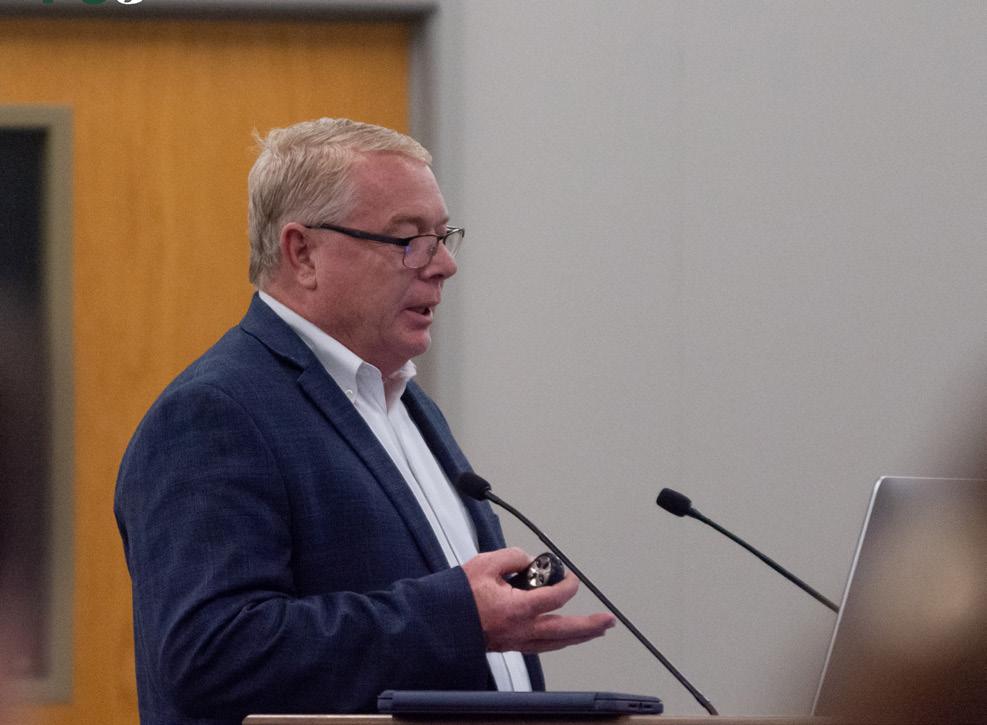

Reasoning: They estimate saving approximately $1.3 million per year by transitioning to iPads. The District Technology Services Department based their results off of adaptability, potential cost savings and durability. Leading up to the decision: The District Technology Services Department based their results off of adaptability, potential cost savings and durability. To evaluate how iPads may potentially affect student’s abilities to learn, District Technology Director David Vignery asked teachers to volunteer for a trial run. The responses were mixed. Some teachers were unaffected by the change, but CTE teachers struggled with the functionality of the device.
District votes to close Pinckney and Broken Arrow Elementary schools
Leading up to the decision: On March 25, the district held two public hearings at Broken Arrow and Pinckney Elementary. Approximately 100 community members showed up to express their concerns regarding the school closures. Voting process: On March 27, a narrow 4-3 vote came after a five-hour meeting filled with concerned families and staff who pleaded with the board against the closings.
Story by Natasha Torkzaban and Lilly Wall


 Story
Story
















by Allison Mayhew and Lilly Wall
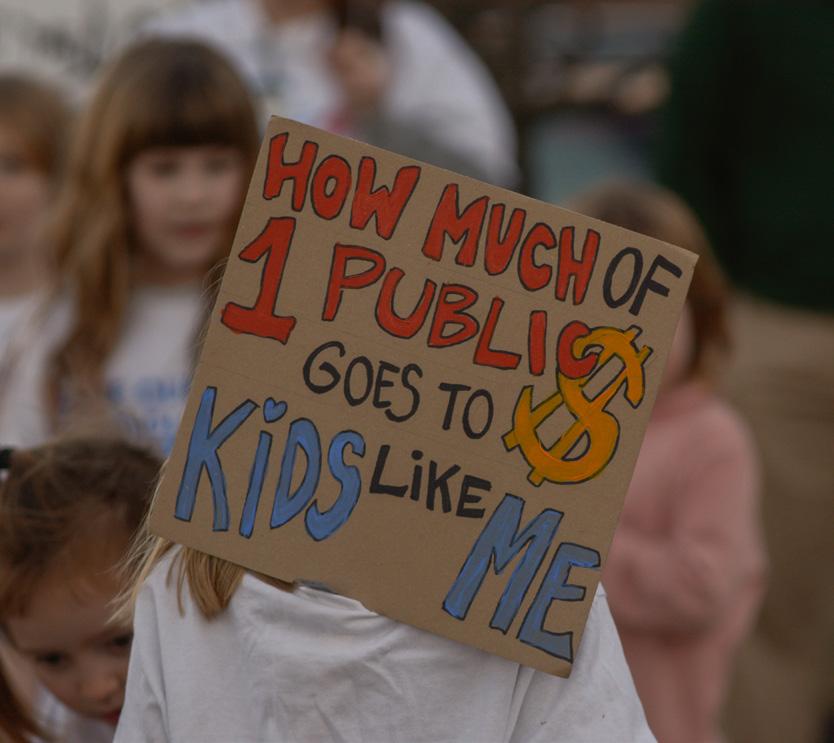
Moving forward



13
Design by Sarah Masterson | Photos by Chloe Cook, Taylor Stone
Through these difficult decisions, Superintendent Anthony Lewis said that although these times appear hopeless, he wishes to provide a sense of hope to the families.
Technology Director David Vignery, addresses the current transition from MacBooks to iPads in schools at the USD 497 Board of Education meeting, held on Jan. 23. Members of the board provide insight on the balance between a cost-effective budget and meeting the academic needs of students. Photo by Chloe Cook
Passions run deep on Feb. 26 as families and children fight to save their schools. Supporters gather to stand together against elementary school closures, displaying the unity and love for their educational community.
Photo by Chloe Cook
On Feb. 26, children and families gather outside of district offices in support of saving local elementary schools.
Photo by Chloe Cook
TEACHERS QUITTING
Teachers are leaving, resulting in students losing programs and teachers
Last year, agriculture teacher Allyson Gillmore left her position to pursue an offer at another school. As a result, the club she was sponsoring, Future Farmers of America, could no longer continue without her sponsorship.
This left many participants, like junior Ingrid Loney, without an agriculture program.
Although the loss of FFA sponsor Gilmore affected many students, it was only one of the numerous programs that have experienced staffing issues. During the school year, over three teachers have left the school.
Principal Amy McAnarney claimed teachers are leaving for many reasons, saying that some are going into the private sector to earn more money than they get their current teaching jobs.
Story by Conrad Hill
“We have typical reasons like retirement, then we also have teachers who maybe move to another district to continue teaching, then last of all we have teachers who leave and are going to the private sector, they’re getting out of education, and they’re going into the private sector because often times they can earn more money doing something else,” Mcanarney said.
Also according to McAnarney, it is harder to find teachers in certain subjects mostly because they are being offered a higher position in a different job.
“[It] depends on the content area,” McAnarney said. “Sometimes it’s harder to find science and math teachers because they can make more money in the private sector in the fields of science and math.”
With the struggles of filling availability for specific teaching roles, students are left without certain opportunities, programs and clubs, and this problem is likely to continue next year.
“It’s likely to be a continuing problem,” McAnarney said. “There’s not as many young people going into the field of education to be teachers. The primary reason for that is they can earn more money at other professions.”
The Free Press - Feature/News 14
“With budget cuts our teacher was offered a better position in a different school,” Loney said. “She left, which sucked because then the program got cut and I was no longer able to have that opportunity here.”
Modeled by Greyson Heiman
SCHOOL CLOSURES
After a lengthy meeting, the USD 497 Board of Education reached a decision regarding school closures
The USD 497 Board of Education voted to close Pinckney and Broken Arrow Elementary on Monday in an attempt to bridge the $9.6 million budget deficit.
Despite two public hearings at Broken Arrow and Pinckney hosted on March 25, community members still showed up to show their support. The narrow 4-3 vote came after a fivehour meeting filled with concerned families and staff who pleaded with the board against the closings.
Through these decisions, board members emphasized the intensity of the decision-making process. Many said they felt burdened by the potency of the factors taken into account.
“I want to acknowledge that [this] vote will have serious consequences for teachers and students, and I apologize for that component of it,” board member Kelly Jones said. “It was certainly one of the harder votes I’ve made. It’s hard sitting up here when two things are true at the same time.”
The school closures are part of a budget cut package estimated to save $4 million proposed by the Futures Planning Committee. This package previously included closing/repurposing Woodlawn Elementary before the motion failed 3-4 to advance to public hearings. The board stressed concerns about transportation costs and the isolation of students near Woodlawn that are across the Kansas river.

With the closing of two schools, many families expressed how methods of transportation and student/family support services may be sacrificed.
“Pinckney was a great support for me and my family,” Pinckney parent Tamara Coyle said. “We were homeless for about a year and a half, but I don’t consider us homeless for that time because of what Pinckney had done for us.”
Additionally, many parents conveyed concerns about what the school closures would look like for minorities.
“It has been said that people are more important than buildings, I agree,” Futures Planning Committee member Anne Costello said. “But when centering on the people, closing these schools is not an equitable choice. It’s not just
Story by Lilly Wall and Natasha Torkzaban
being closed, but some of our more vulnerable communities are being broken apart.”
Through these difficult decisions, Superintendent Anthony Lewis said that although these times appear hopeless, he wishes to provide a sense of hope to the families.
“Sometimes the most difficult decisions come with the greatest opportunities,” Lewis said. “Although dark it may seem, there is shining light on the other side.”
The board met again on April 10 to discuss the next steps. This included finalizing district boundaries, creating bus routes and constructing a smooth plan for families who will face new schools in the fall. Follow along at fsfreepressonline.com for additional information regarding budget cuts and school closures.
15
Design by Sarah Masterson | Photos by Lady Ortega-Perez
On February 26, children and their families’ emotions were rampant as the Board of Education discusses closing local elementary schools. After multiple more board meetings and deliberations, it was declared that Pickney and Broken Arrow will close at the end of the current school year. Photo by Lady Ortega-Perez buildings
STUDENT ATHLETE COMMITS
The class of ‘23 student athletes share their plans for furthering their athletic and academic careers next year
BEN BARNETT Soccer
Drury University
Senior Ben Barnett has committed to Drury University to play soccer. Barnett plans to major in Biology.
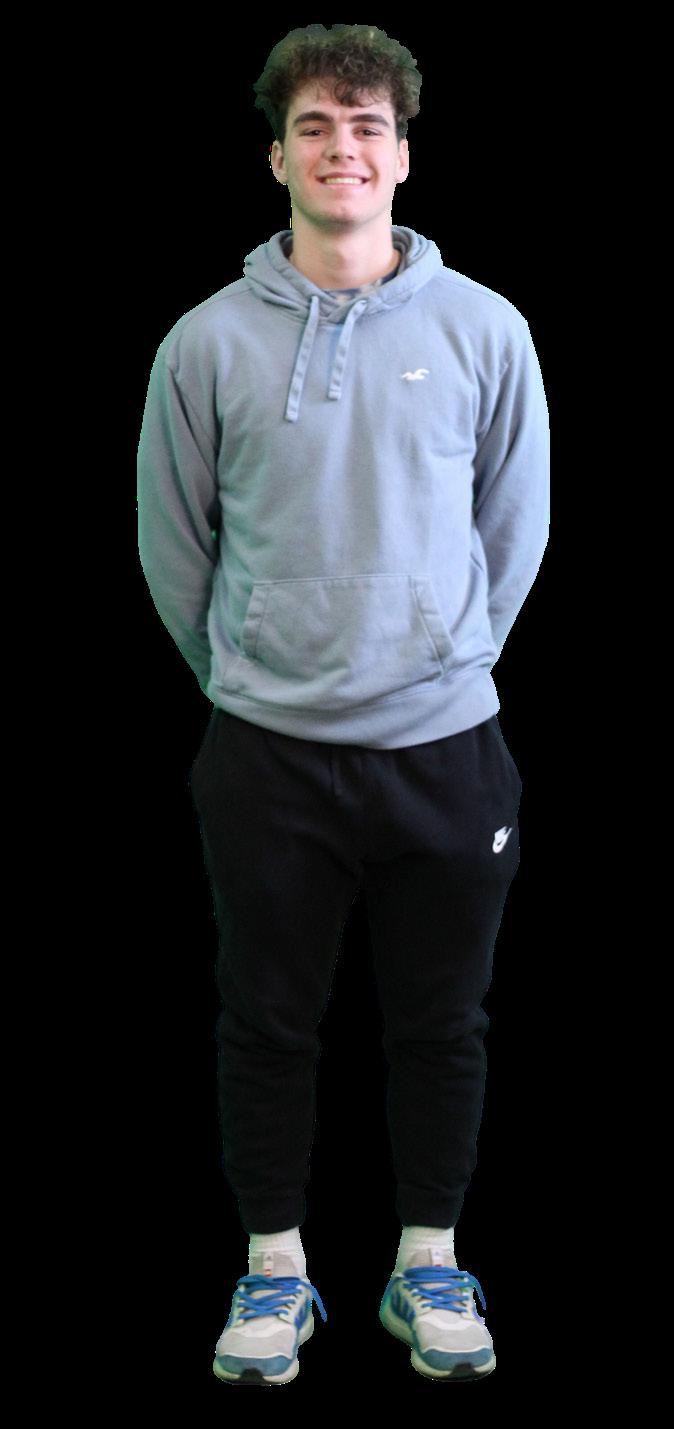
LAURA KINSCH Wrestling
Ottawa University
Senior Laura Kinsch has been a part of girls wrestling and has now made her commitment to Ottawa University to continue her athletic and academic career. Kinsch is majoring in sociology. “I’m most excited to be a part of helping grow women’s wrestling and entering into the next level,” Kinsch said. “The second I started to practice with them I felt right at home and that was very important to me.”

“The campus was nice in a pretty cool city,” Barnett said. “The team is also pretty good and competitive in a good conference…it just seemed like a very good fit for me.”
REESE HULCHER
Senior Reese Hulcher has made her commitment to University of Kansas to run track. As of now, Hulcher plans on majoring in exercise science and minor in business.
“I chose KU because it’s close to home so I’ll be able to see my family a lot,” Hulcher said. “I love the school and I love the culture. I’m most excited to compete and just get better.”
Collected
by Emma Wiley
ANGEL WALLER Dance
Texas Tech University
Senior Angel Waller has danced at Free State all four years and has now decided to further her academic and athletic career at Texas Tech University. Waller is majoring in dance and minoring in sports management.
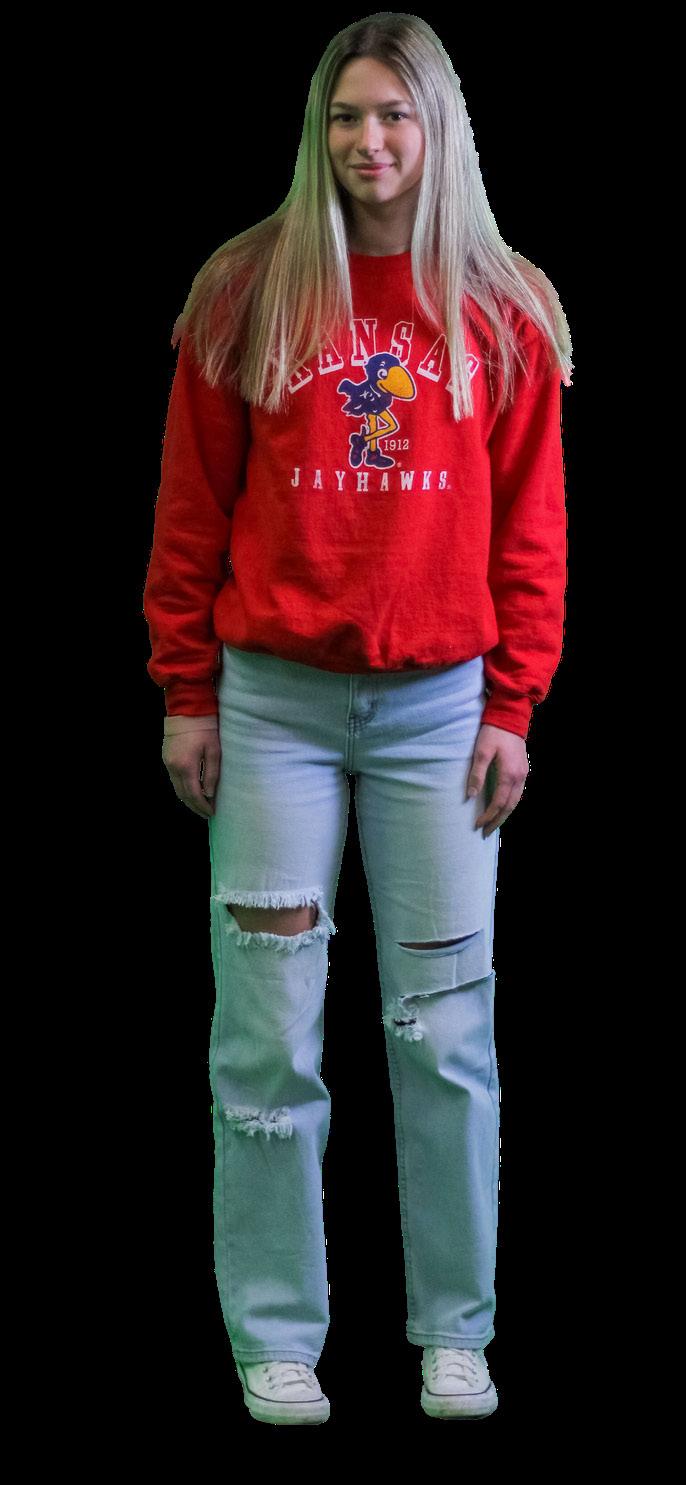
“I’m excited to dance and just live,” Waller said. “Moving away and figuring stuff out on my own and just dancing.”
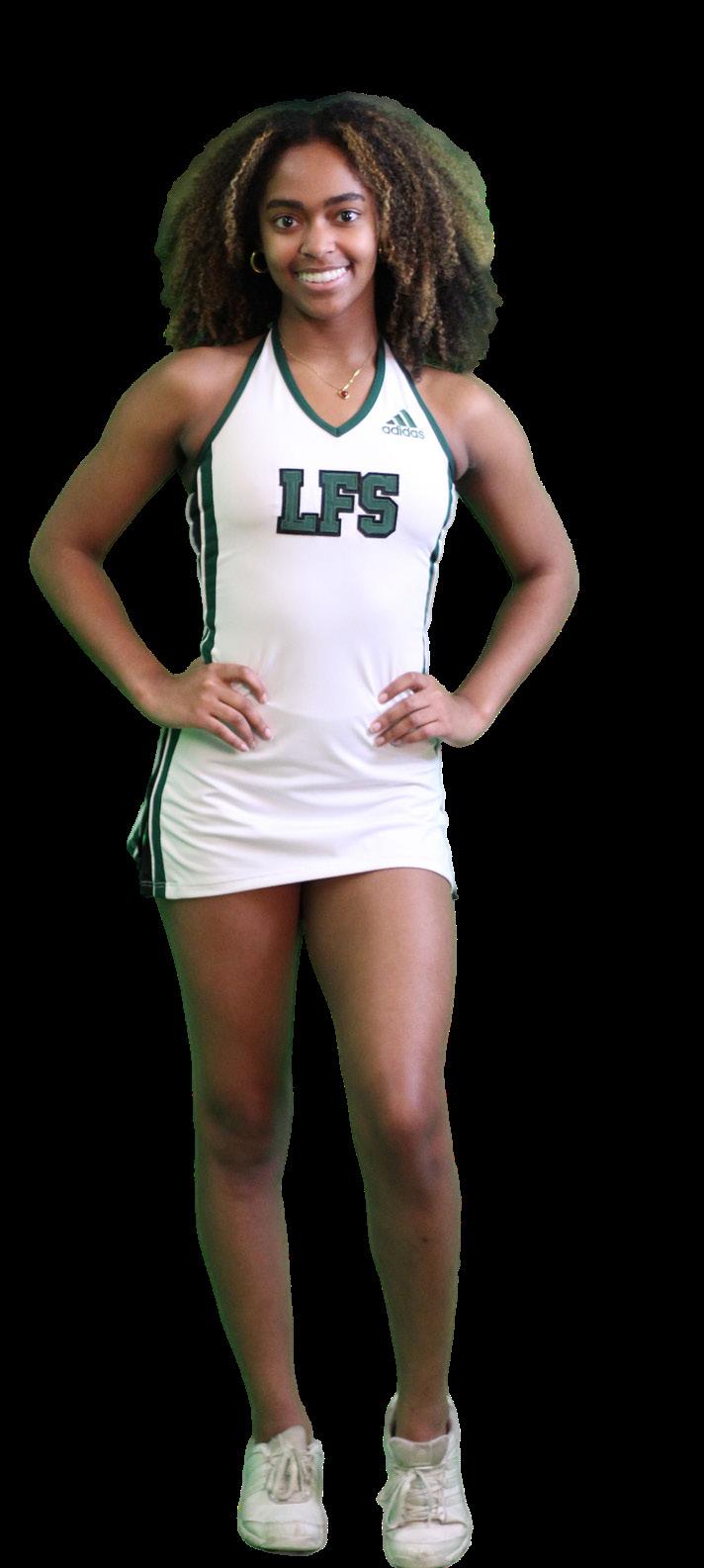
The Free Press - Sports 16
Track & Field University of Kansas
COMPETE TO REPEAT
The 2023 girls swim and dive team looks to defend their title as the Sunflower League reigning state champs
Girls swim and dive has started this season hoping to repeat as state champions.
“I’m really excited to compete for back to back state championships,” junior Liza Engelbrecht said. “We have many new swimmers, so I’m excited to see what we can accomplish.”
Last season ended with an impressive showing in the state competition. At least one firebird swimmer finished top eight in each event, resulting in a state championship. This season, each swimmer has identified individual goals to strive for, but the main goal for the team is very clear: to repeat as state champions.
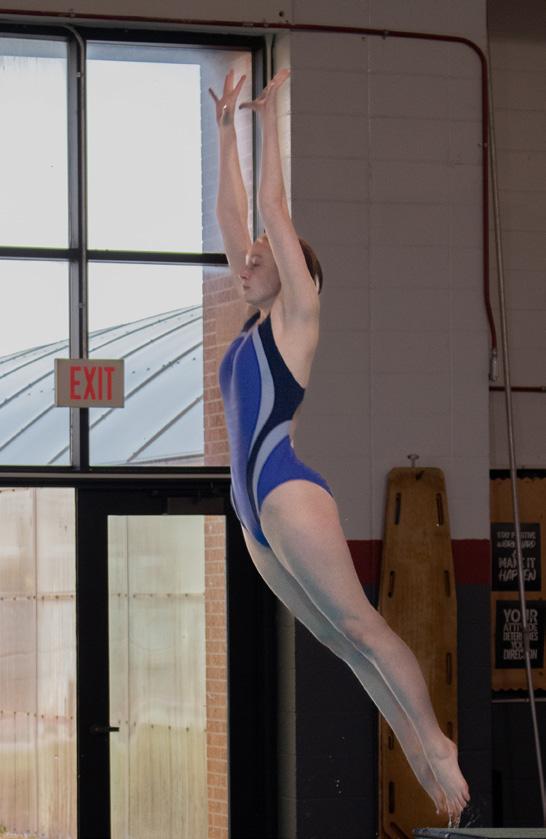
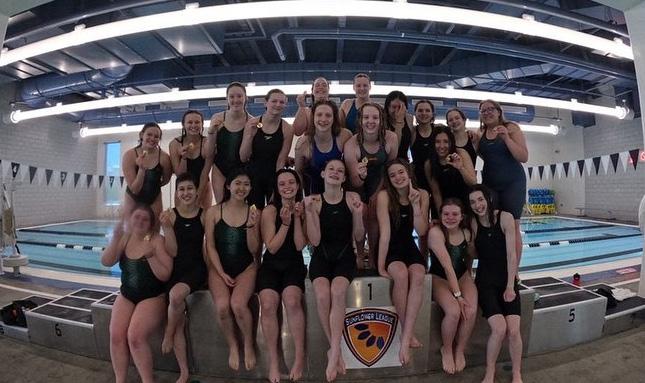
“A lot of the girls are looking at times already and saying their goal is to medal at state and league, and to contribute to the team as much as possible,” coach Annette McDonald said. “But, of course the team goal is to repeat as state champs.”
Despite the loss of six seniors last year, most of the heavy contributors to that state championship run have returned. Seniors
Bradie Ward, Halle McCullough, Samantha Packard and junior Liza Engelbrecht round out the core of high finishers in state events. They have taken ownership of the lead role in the program and are helping to build up both new and returning swimmers.
To reach such highgoals, support and encouragement is needed. The team feeds off of positive energy and encouragement from each other, which pushes them to work hard and reach their goals. Swim season is demanding given the amount of practice time that is required, so the encouragement each swimmer contributes helps to elevate their goals.
Swim practice began on Feb. 27 and the chance to become back-to-back championships grows closer each day.
17
Design by Raelynn Keefer | Photos by Geneva Sabatini, Eleanor Roust, Lady Ortega-Perez
Story by Thomas Patton
“We call on our senior leadership for everything,” McDonald said. “We use them as examples for new swimmers learning a new strategy or technique to help them improve.”
“I just want everyone to do their best and feel confident in the times they are putting up, and to feel like they accomplished something good this season,” senior Olivia Romero said.
follow @fsjounalism on Instagram & @FSJ_Sports on Twitter for updates on sports
STARTING HER DIVE, junior Mallory Qualseth jumps off the diving board. Although it has a competitive aspect to it, Qualseth has found that diving competitions are often much more fun than aggressive, “You always want to help out because our scores contribute to the overall score,” Qualseth said. “But, everyone’s just really nice and not super competitive.”Photo by Eleanor Roust
AFTER WINNING FIRST PLACE, the girls Swim and Dive team hold up medals in excitement. Sophomore Jocelyn Wilson, who placed 6th in the 200 Yard Individual Medley, has her sights set on next season and hopes to make it to state again. “We have bonded as a team and set out our goals for the season,” Wilson said. “[We] have our sights set on winning state.” Photo submitted by Free State Swim & Dive
ADVANCING AI
Rising artificial intelligence ChatGPT impacts learning in classrooms
Story by Lilly Wall
In the pinch of needing to meet an essay deadline or finding starting points for an assignment, many students have begun to rely on the rising AI-Powered chat-bot, ChatGPT.
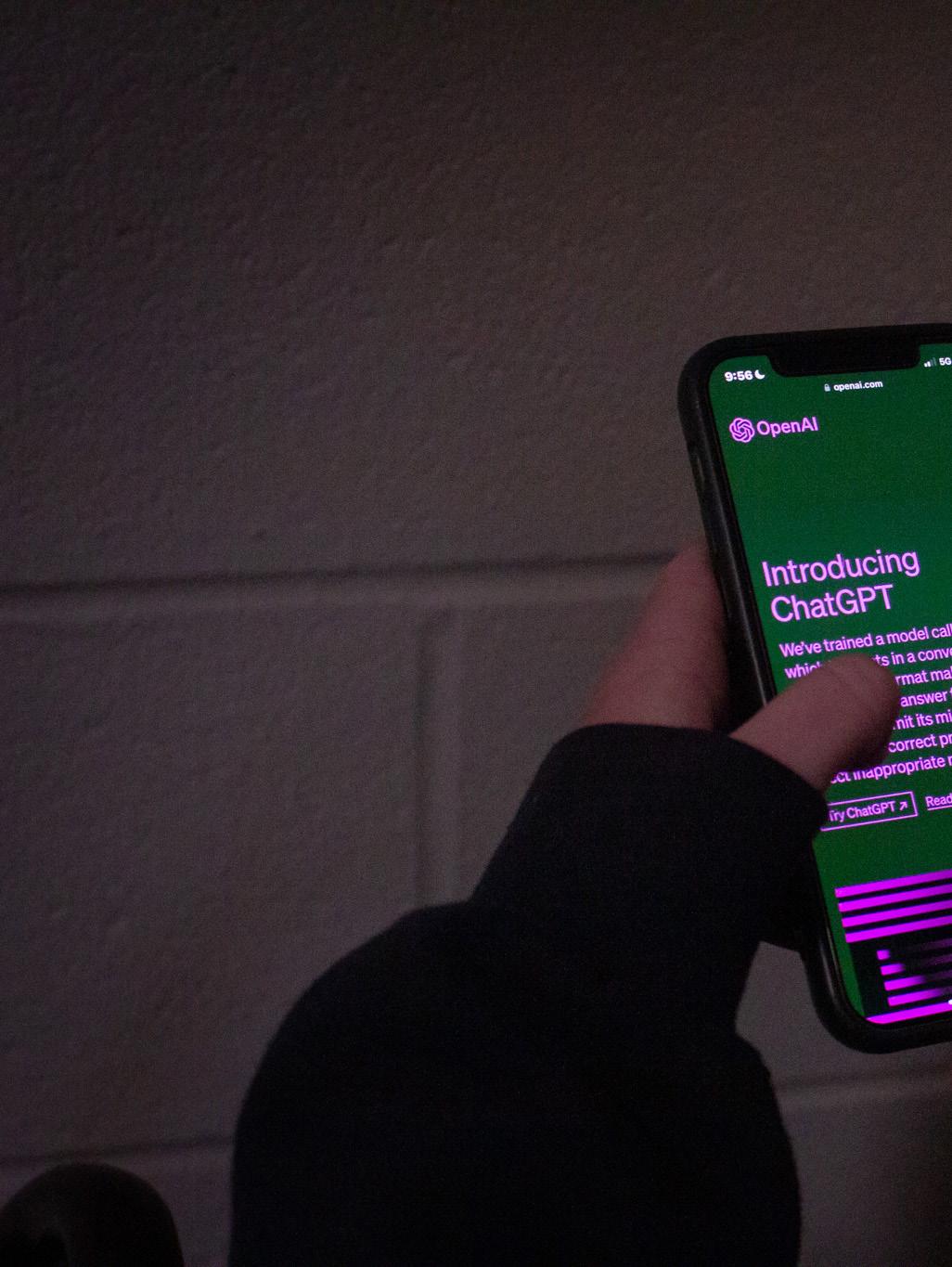
ChatGPT, developed by the research and deployment company OpenAi, is an artificial chat-bot that launched in Nov. 2022. The model generates text responses based on the user’s input. The responses are based on information from websites, books, news articles and more.
For many students, ChatGPT is a tool for finding starting prompts, reading information or getting inspiration on assignments. Senior Yejun Yun said he uses the chat-bot academically to follow up on additional information for classes, but not using it as a starter beforehand.
As for teaching, English Department co-chair and teacher Kylee Johnston uses the bot as a research engine to find examples in the midst of lesson planning, and has created examples of satire for students while writing satire essays.
“It was nice to be able to put in a prompt like ‘write a satire on capitalism’ and just see the format and tone of those types of things,” Johnston said.
As of now, ChatGPT is blocked on district-provided devices to eliminate students’ temptation towards using it for plagiarism. Yun advocated for the site to be unblocked from the USD 497 computers, as he said it can be used as a learning resource.
“The school should unblock it,” Yun said. “Especially for people who are best equipped to use it, they can use it to enhance their learning to a degree that wasn’t possible beforehand.”
The Free Press - Academics 18
“If I was in a class and there’s something I want to follow up on [that] the teacher said, I ask that question to it and normally it can give me a separate explanation so I can learn at my own pace,” Yun said.
Comparatively, English teacher Sophia Coen believes the site should be blocked because of its effects in the classroom ethically, but can also be used as a tool to develop discussions on technology.
Furthermore, ChatGPT’s popularity has sparked use through essay writing. Coen said that although essays are time consuming, they are an exercise in critical thinking, and she does not think letting a program do the work for them is ethical, nor will it create student success.
“What it delivers isn’t an A paper in my class. It’s barely even a D- paper” Coen said. “It’s inappropriate for essay writing because you’re not even going to retrieve the grade you want from that.”
To eliminate plagiarism in English essays, many teachers spend time using various plagiarism checkers during the grading process. For Johnston, she copies and pastes the student’s text into a ChatGPT detector, which declares the work’s originality on a scale from fake to real.
Additionally, in response to the rise in ChatGPT, Johnston envisions her English classes possibly moving towards writing more on paper next year to increase students’ writing authenticity and basic English language skills.
“Students understand overall that writing well, reading well and speaking well is important for whatever they do… we’re going to be tech free for a while to force ourselves sometimes to increase our brain power and ability to read, write and think,’” Johnston said.
Aside from ChatGPT’s implementation in the English department, junior John Platkowski believes the chat-bot is essentially a better version of Google for most academics, and has its benefits in the STEM field. Furthermore, he said AI will develop various career fields as a whole.
“It’ll be vastly beneficial… it’s going to at the very least make programming a lot easier, engineering a lot easier, math a lot easier, [and] scientific studies will be utilizing AI in the near future,” Platkowski said.
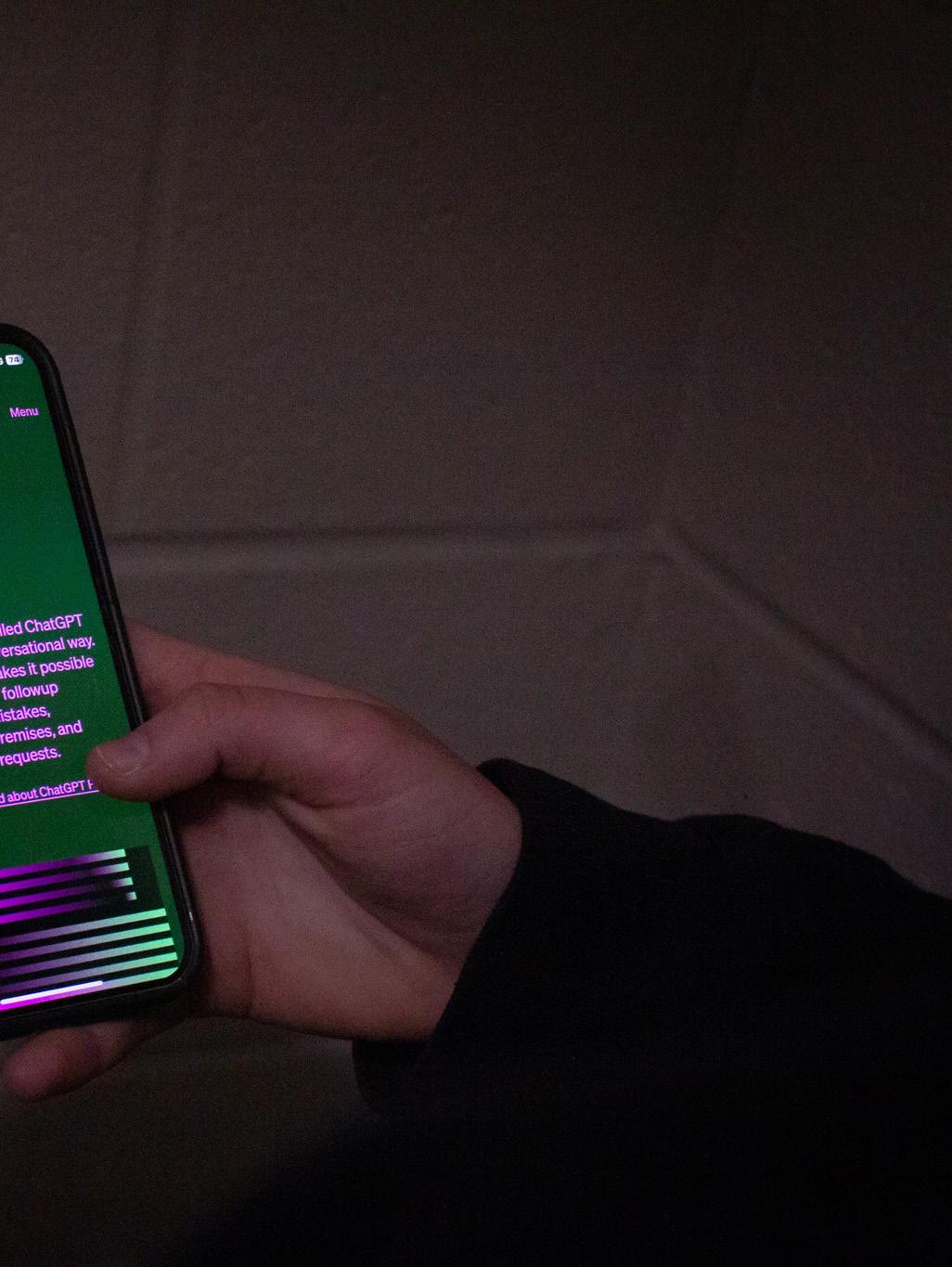
19
Design by Mylie Brillhart| Photos by Amelia Wiles
“It’s fair to block it. We block a lot of sites; however, I do think that there are benefits if we embraced it a little bit more,” Coen said.
“Instead of blocking it and drawing attention to it, we could utilize it for academic purpose.”
STANDARDIZED TESTING: IN OR OUT?

Students and staff discuss the effects of standardized tests becoming optional at many colleges
Standardized tests have long been a required part of the college admissions process, with students spending months beforehand studying and even taking classes to help prepare. But now many schools have changed to a test optional policy, allowing students to choose whether or not they submit their scores.
Many colleges began implementing this policy around 2020, citing the lack of test availability due to the pandemic, but the trend began a few years earlier. Teacher Jeffrey Morrison said that around 2017-2018, colleges began to deemphasize the importance of standardized tests.
Another reason for this big change is the bias presented in standardized tests. Students from wealthy backgrounds have access to more resources that aid in test performance.
However, not everyone agrees with the factors behind test optional policies. Senior Abby Coons believes that standardized tests provide a more level playing field. Coons submitted her test score, and received scholarships and gained entrance into selective engineering programs.
Story by Lauren Tao
Other students like senior Joel Harrison said that standardized tests aren’t representative of people’s true abilities, and instead, they are about strategies to increase your score.
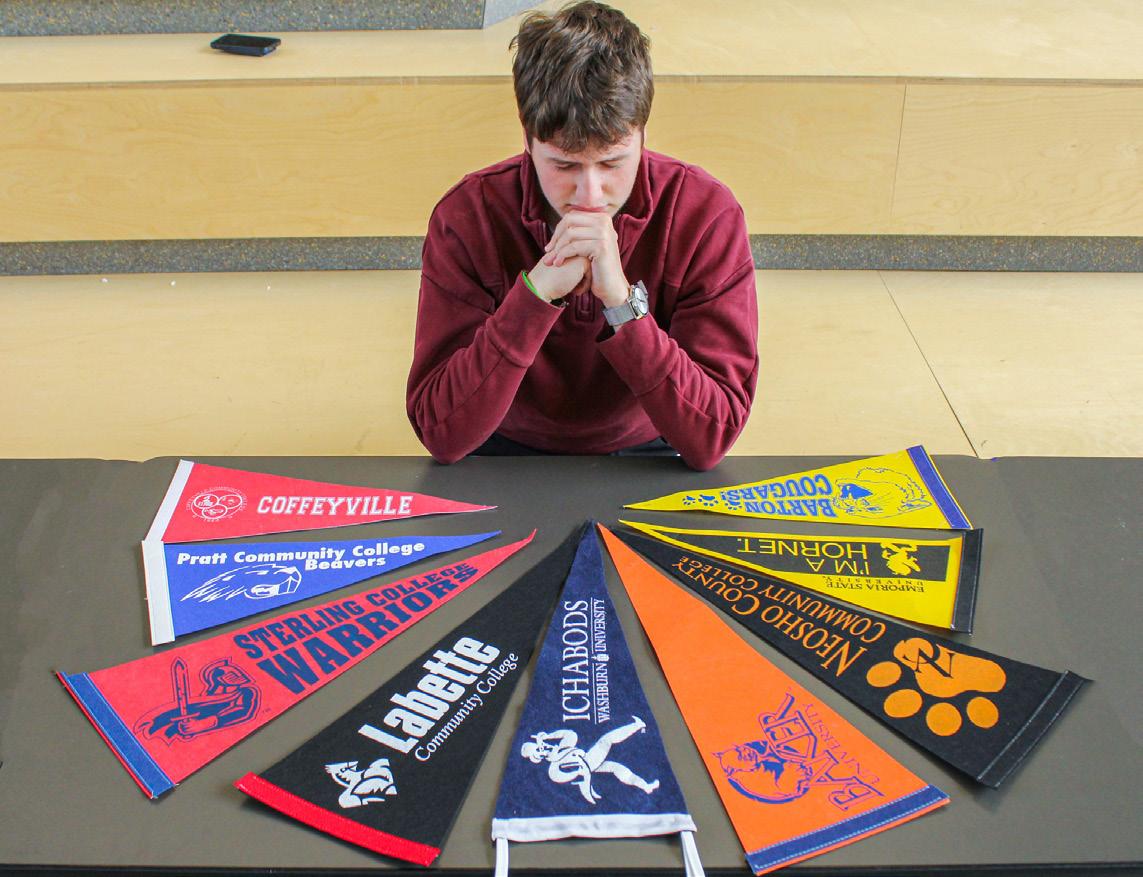
“Since people have access to more complicated, gimmicky strategies to get better scores, it’s no longer standardized,” Harrison said.
Harrison said that he performed well on his test despite his GPA being in a lower academic bracket.
Morrison said that the racial and gender biases may be an inherent part of the standardization.
While the future impact of standardized tests remains unclear, one thing Morrison, Coons, and Harrison can all agree on is their continued importance in merit based scholarships.
The Free Press - Academics 20
“Even if you have private tutors, you’re still doing the work,” Coons said.
“It’s hard to get away from [bias], just because they are standardized based on the population of our country,” Morrison said.
Junior Greyson Heiman ponders over colleges. Juniors took the ACT on Feb. 28. “It’s really great having the ability to not submit standardized test scores because it takes the pressure and anxiety out of taking a test like the ACT or SAT,” Heiman said. Photo by Lady Ortega-Perez
SAY HELLO TO XELLO
Students share their opinions about the career and life website, ‘Xello’ Story by
Xello is a college and career planning website that creates an idea and plan to help students with their oncoming futures. However, while some students think it is a good way to help prepare for the future, others think that it is time consuming and unnecessary.
Xello has been implemented during Extra Class Time [ECT] as it is a graduation requirement, but students have mixed opinions about whether it should be used or not.

“I don’t think anyone actually takes into consideration what Xello actually says to us,” freshman Corinne Kingsley said. “Some of the things are helpful, but not everything because there are topics that aren’t as important and don’t matter as much as others.”
Xello uses its algorithm to determine what best fits you, whether it be a good college, or simply what personality type best fits you.
Arianna Waller
Xello does not grade students based on how quick they answer the questions nor do they time quizzes.
Other freshmen agree with Andrews and Kinglsey, saying that Xello isn’t a very useful website.
“A lot of people rush through it and don’t actually answer the questions just to get it done,” freshman Braylon Ramsay said. “So I don’t think it’s too helpful.” Ramsay said that many kids just do it to do it instead of taking the time to sit through it and take in the information that Xello provides.
Although some students think it isn’t helpful, others disagree, saying that it may be resourceful to those that need assistance for their futures.
“It is a useful resource for people who don’t know what they want to do in life and to help people that do know what they want to do narrow it down,” freshman Dae Martin said. “Xello helped me find a career path. At first, I didn’t know anything. I didn’t know what I wanted to do, and it helped show me my interests and pick a few options.”
Xello has given students an opportunity to expand their curiosities about their futures in ways they usually couldn’t.
Students go through different lessons on the website, including multiple quizzes that can help them choose a career path that is best fit for them.
Freshman English Teacher Sophia Coen has stayed in the middle, saying that it is helpful as much as it is unhelpful.
“It’s important for students to have a career plan, but it’s also important for that plan to feel like it actually means something,” Coen said. “I don’t know if Xello always helps them feel like it. I personally don’t have a problem with it, and it’s not so time consuming that it creates an issue.”
Xello will continue to be implemented into schools for the rest
21
Design by Lauren Tao | Photos by Elinor Russo, Lady Ortega-Perez | Illustration by Allison Mayhew
“No one really takes it seriously, so no one genuinely gets the concept of it,” freshman Taylor Andrews said. “But,if you do take it seriously, people can find out new information about themselves and know what to do for the future.”
As part of the school’s requirements, a student completes a Xello lesson during ECT. Although sophomore Kathryn Hale found Xello lessons to be a chore, she realized the benefits that the lessons could have. “I don’t like doing Xello lessons, but they help me think about careers I may want to have in the future,” Hale said. Photo by Elinor Russo
BLUEPRINT OR AP: WHICH IS RIGHT FOR YOU?
Learn about differences between Jayhawk Blueprint courses and AP courses

 Story by Stella Mosier
Story by Stella Mosier
BLUEPRINT AP
Jayhawk Blueprint courses are an option for all USD 497 students who would like to earn official college credits during high school, which is achieved through dual enrollment at the University of Kansas and the high school. Costing $309 per course, students receive their credits simply based on the completion and passing of the class. Math 101, English 101 and 102, Communications 130, US History 128 and 129 and Biology 100 are all currently offered. By earning college credits as a high school student, you are given the opportunity to take less classes throughout college and a guarantee of saving money. Additionally, the passing of the course can add up to 0.5 points to a GPA. It is guaranteed that the credit you earn will transfer to any public 2-year and 4-year institutions of higher education in Kansas; however, eligibility for transfer of the credit to other schools is not guaranteed.
AP classes are offered to high school students across the nation as an opportunity to take the equivalent of a college course as a high schooler. Over the course of the year in an AP class, students learn at an advanced pace to prepare for a final exam, typically held in May. Students need to receive a high enough score on the exam to receive a college credit. Required scores differ for different colleges and tests. If students do not earn a high enough score on the exam, they risk not receiving any college credits at the end of the course. AP exams come with a fee of $97, which is considerably cheaper than a standard college course. Similarly to Jayhawk Blueprint classes, AP classes have the potential to boost a student’s weighted GPA by up to a full 0.5 point. The difficulty level of AP classes are often a deterring factor for many students, but a challenge may better prepare a student for their post graduate studies. AP course credits are redeemable at nearly all universities and colleges; only a few schools do not accept them.
The Free Press - Academics 22
FOR MORE INFORMATION: FOR MORE INFORMATION: AP EXAM OR
OPINIONS AND COMPARISONS
Senior Gus Peters took AP Lang last year, and is now enrolled in English 101 and 102. Given his score on his AP exam, he will not receive any additional credits for the Jayhawk Blueprint course. However, he does say that there are many benefits to taking a Blueprint class.
“Compared to AP classes, KU Blueprint classes definitely give you a better understanding of what professors might be looking for or what college grading might look like,” Peters said. “It’s definitely a finite way to get those credits. Plus, AP classes don’t automatically earn you credits, but KU blueprint classes do.”
Peters believes from personal experience that Jayhawk Blueprint courses tend to be less challenging than AP courses, but ultimately, both options achieve remotely similar credits.
Both AP courses and Jayhawk Blueprint courses are allow for students to get ahead and expand their skills as a student. Students are highly encouraged to take advantage of these wonderful opportunities.
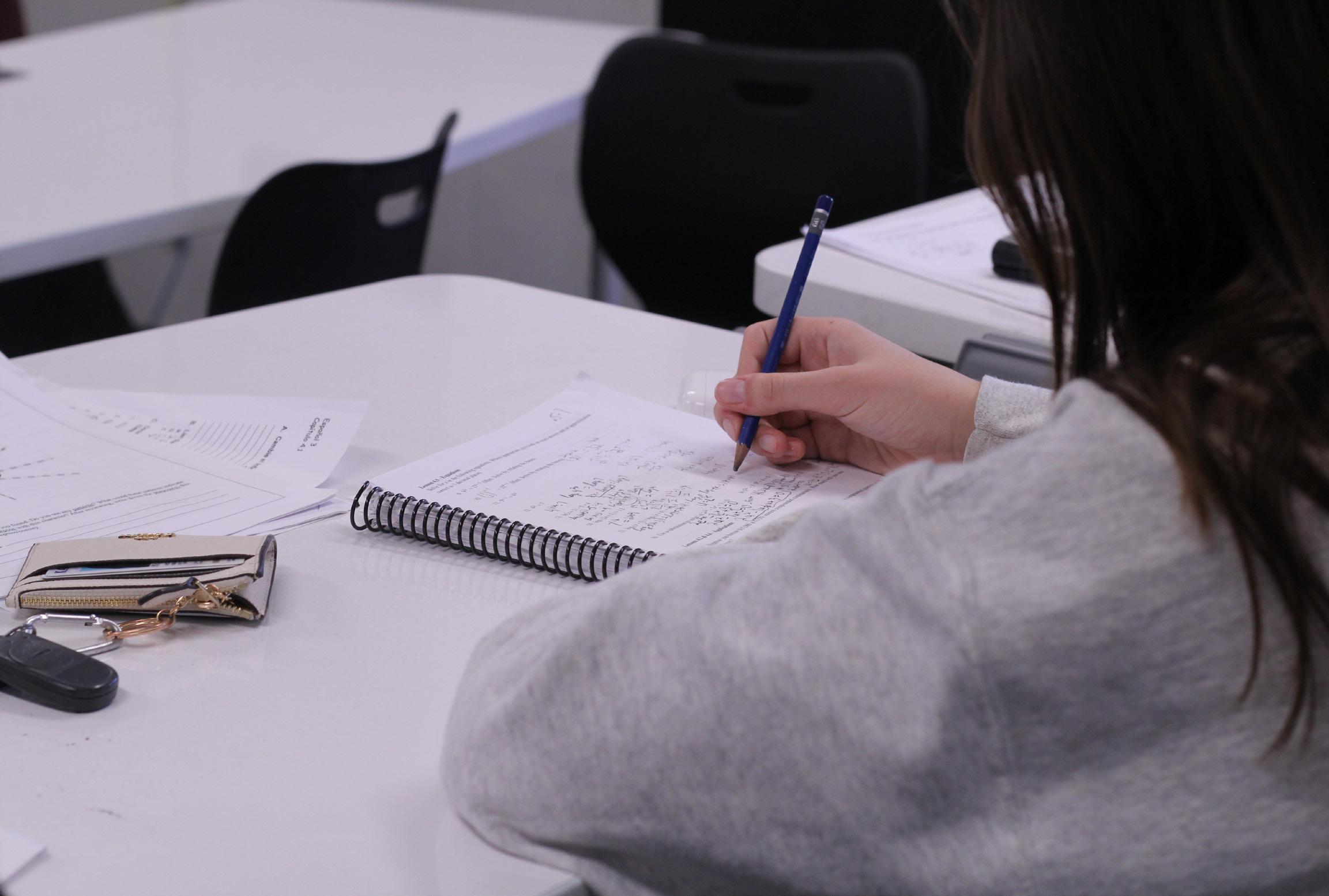
23
Design by Mylie Brillhart | Photos by Taylor Stone
SENIOR Anna Booth focuses on her University of Kansas Math 101 work, while listening to the teachers lecture
Photo by Taylor Stone
AP math teacher Annette McDonald said that the difficulty of AP courses is a great benefit to students.
“You get a little more rigor in your course. In that rigor, you learn how to persevere through more challenging coursework,” McDonald said. “It’s fun to be challenged and learn new things from different perspectives.”
ALBUM REVIEW:
DID YOU KNOW THAT THERE’S A TUNNEL UNDER OCEAN BLVD
Review by Allison Mayhew
Lana Del Rey’s music career has been marked by success and controversy. “Did you know that there is a tunnel under Ocean Blvd’‘ is a deeply personal album that gives Del Rey’s introspect on religion, love, femininity, family and a search for self-identity.

The album feels mellow and can lack instrumentation, and many tracks do not stand out, though her lyricism remains a highlight and shows a sense of maturity in her career. Del Rey creates a strong message about putting herself back together after commonly being perceived as unhappy and unstable.
The opening track, “The Grants”, begins the album by exploring the idea
of an afterlife and taking memories of her family with her. Followed by the first single released, “Did you know there is a tunnel under ocean boulevard”, which successfully set the tone for the rest of the album. The repetition of the lyrics “When’s it gonna be my turn/Don’t forget me”, creates an eerie feeling that carries throughout the album.
Self-exploration is especially mentioned throughout the album as Del Rey enters a new musical era. “Grandfather, please stand on the shoulders of my father while he’s deep-sea fishing” and “Kintsugi” share the story of how she rebuilt herself. “I know they think that it took thousands of people/To put me together again like an experiment/Some big men behind the scenes/Sewing Frankenstein black dreams into my songs/But they’re wrong”.
Track 9, “Fingertips” is a significant track to the album that delves deeply into questions of Del Rey’s familial relationships; specifically discussing her mothers’ absence during her childhood and how that has affected her. “Will the baby be alright?/Will I have one of mine?/ Can I handle it even if I do?/It’s said that my mind/Is not fit, or so they said, to
carry a child/I guess I’ll be fine”. These questions express her desire to feel motherhood, with also over-carrying concern about her ability to. The lyrics again allude to the fact that she is dealing with the negative perception of her reputation.
Popular track “Let the light in” brings in a guitar for one of the only times in the album, creating a sound that feels closer to the unforgettable “Norman F**cking Rockwell” era. The guitar, piano and voices blend together to create a delicate sound. “Look at us, you and I, back at it again/’Cause I love to love, to love, to love you/I hate to hate, to hate, to hate you” these lyrics simply express the ups and downs of her relationships and the impulsive feeling it creates.
Del Rey ends the album with “Taco Truck x VB”. Here she makes a callback to her widely praised “Norman F**king Rockwell”, which established her career as an appreciated lyrcisist and artist by the popular media. It ends the album with a nostalgic touch on her career and her growth.

The Free Press - Arts & Entertainments 24
CARLOS’ CUTS
Student owns and operates a haircutting business
The school has many ways for students to pursue artistic expression, from ceramics to the Phoenix Collection, but there are students who express themselves outside of the classroom through different mediums.
Senior Carlos Mendoza is a self taught barber who has launched a business of cutting people’s hair. He began cutting the hair of his friends and family, and now has opened his skill to everyone.
“I really started, officially, looking at this as a career around October last year,” Mendoza said. “I used to cut before that but not professionally. I’d just cut just to cut; before then, I never really thought of it as something I could do for a living.”
The atmosphere is different from a traditional barber: Mendoza takes more time to ensure a better haircut.
“It feels better to have a friend cut your hair instead of going to a place,” junior Utah Hester said. “It’s relaxed. It’s calmer. Carlos has more time just to make it look good.”
Carlos is not only a skilled barber, but also an inventive one. If his clients want him to, he will incorporate new styles and freestyle designs.
“My curls are very important to me, so it’s important to keep the curls there,” senior Stephan Sabillon said. “But I also get tapers and fades from Carlos. The most recent haircut he did was a drop fade, and that was something he only did once prior to getting me cut.”
Students also utilize Mendoza’s skills for their regular haircuts, or even larger events.
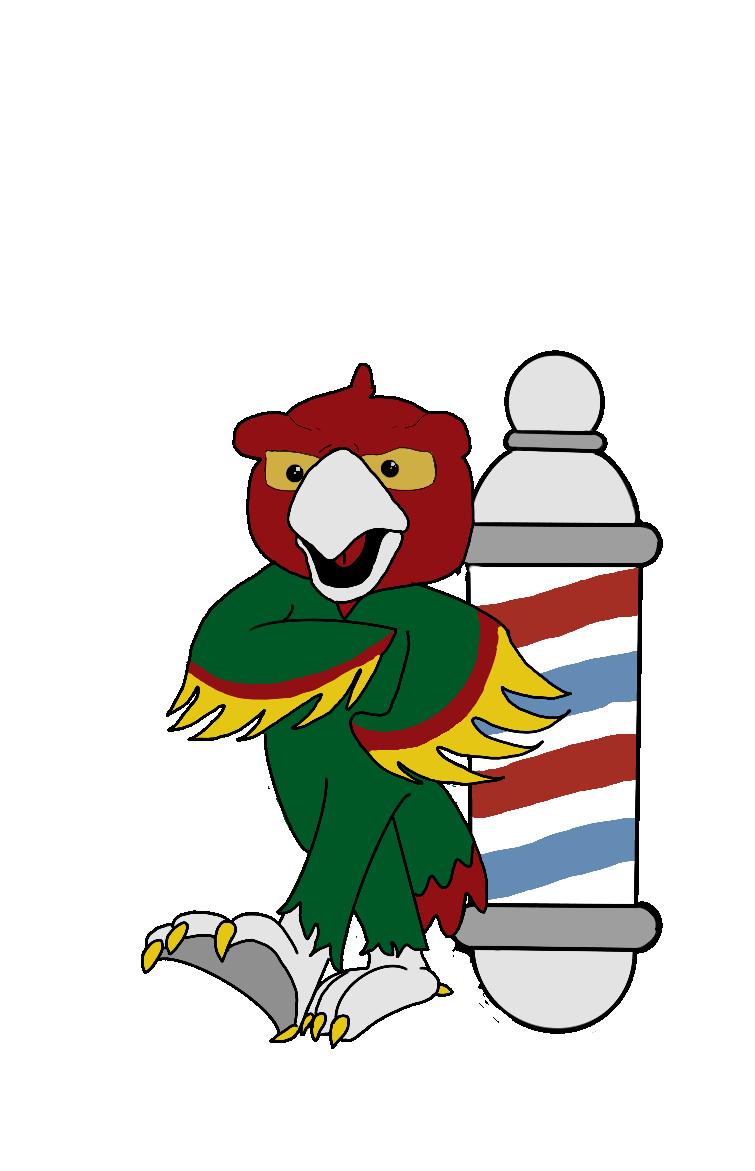
“Every time he tries to do something new, so I’m going before prom,” Sabillion said.
Bookings for Mendoza go through his business account: @ carloscutsfr on Instagram, which also hosts pictures of his work. Many students trust Mendoza to deliver a quality haircut, and urge anyone to give the up-and-coming barber a try.

“He’s super relaxed about it and he’ll try his best to get you exactly what you want,” Sabillon said. “You can if you feel comfortable telling him what you want. And I think that’s important and looking for a barber.”
Story by Tommy Taylor
25
| Illustration by Lady Ortega-Perez
Design by Sarah Masterson
@carloscutsfr on Instagram
SMARTIES IN STEM
Women in STEM produce school wide science fair for all STEM clubs
When co-presidents juniors Hannah Stone and Yael Gillath started the women in STEM club last year, their goal was to work together to get people to feel more comfortable in STEM. Through this, the women in STEM club organized the very first science fair on April 5 in the commons.
The event lasted about an hour, having students go around and learn about the STEM clubs. Each club had a booth with all the details about what the club entails. Getting people into STEM was a big goal for this event.
When planning the event, women in STEM was in contact with other STEM clubs such as bio-med club, pre-med club and team STEAM, as well as administrators to plan the event.
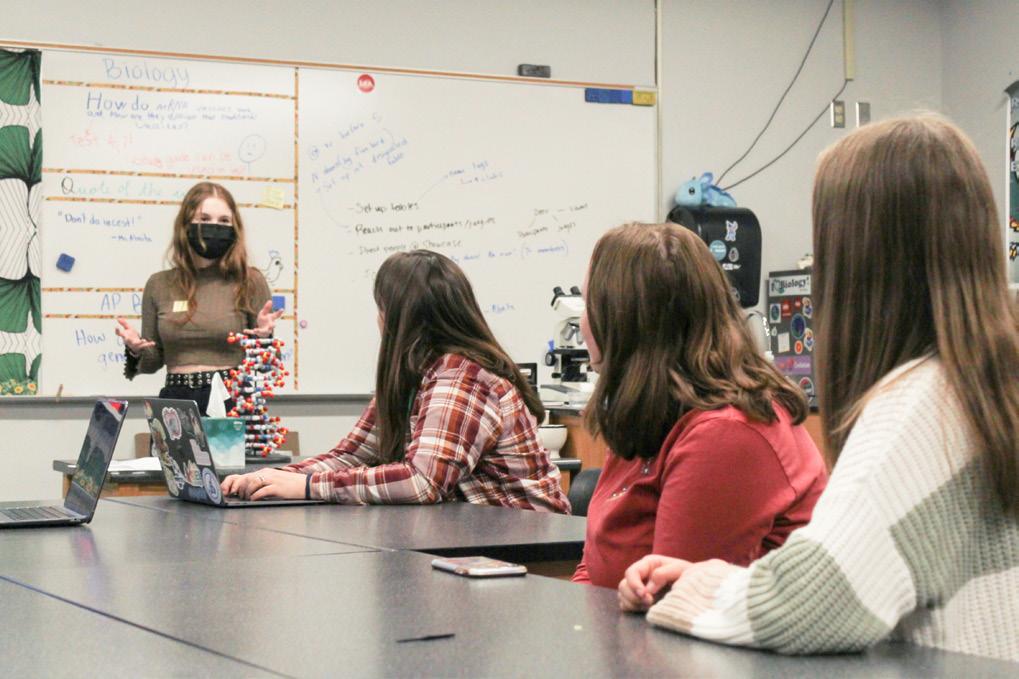
All of these jobs were behind the scenes work. They met every Wednesday to divide the tasks they needed to complete to hold the event.
“Organizing the event was tricky, but we persevered with a lot of planning, structuring and overall navigating schedules,” Gillath said.
The women in STEM club wants to include people who have been shunned from the STEM
Story by Maeve Nichols
universe. Stone stated women in STEM aims to make marginalized groups familiar with these subjects and provide them with opportunities in STEM.
When hosting a brand new event, it was difficult to find people to participate, and ensure that they knew what it was about. The STEM club spent time emailing and networking to get the word out. They created interest forms for those who would like to participate in the event.
“Having an event where you need people to participate to make it work is nerve racking; we don’t know what to expect,” Abeita said.
Women in STEM’s main goal was to publicize STEM clubs and get people to see what they like. Stone said exploring your interests at a convention like this is an accessible way to join a club.
Moving forward Women in STEM are planning on continuing their biannual outreach with the public library, as well as working on interactive activities with elementary students.
The Free Press - Feature 26
Junior Yael Gillath speaks about her project to fellow students at the Women in STEM Showcase hosted at Free State on April 5, 2023. Photo by Hannah Stone
“As far as I know, there has never been an event like this at Free State,” club sponsor and biology teacher Sara Abeita said. “We get to dream big and design the event how we want to.”
“It’s an opportunity for students to express themselves outside of class,” Stone said. “We wanted people to be able to explore their niche interests in STEM.”
STUDENT SUCCESSES
Students excel at the yearly regional Scholastic Writing Contest Story by
Arianna Waller
Sophomore Gillian Sellet competed at this year’s annual Scholastic art and writing awards. During this virtual event, Sellet won the Gold Key for her poem “Lingua Franca’’ and for her science/fantasy story “All That Remains”.
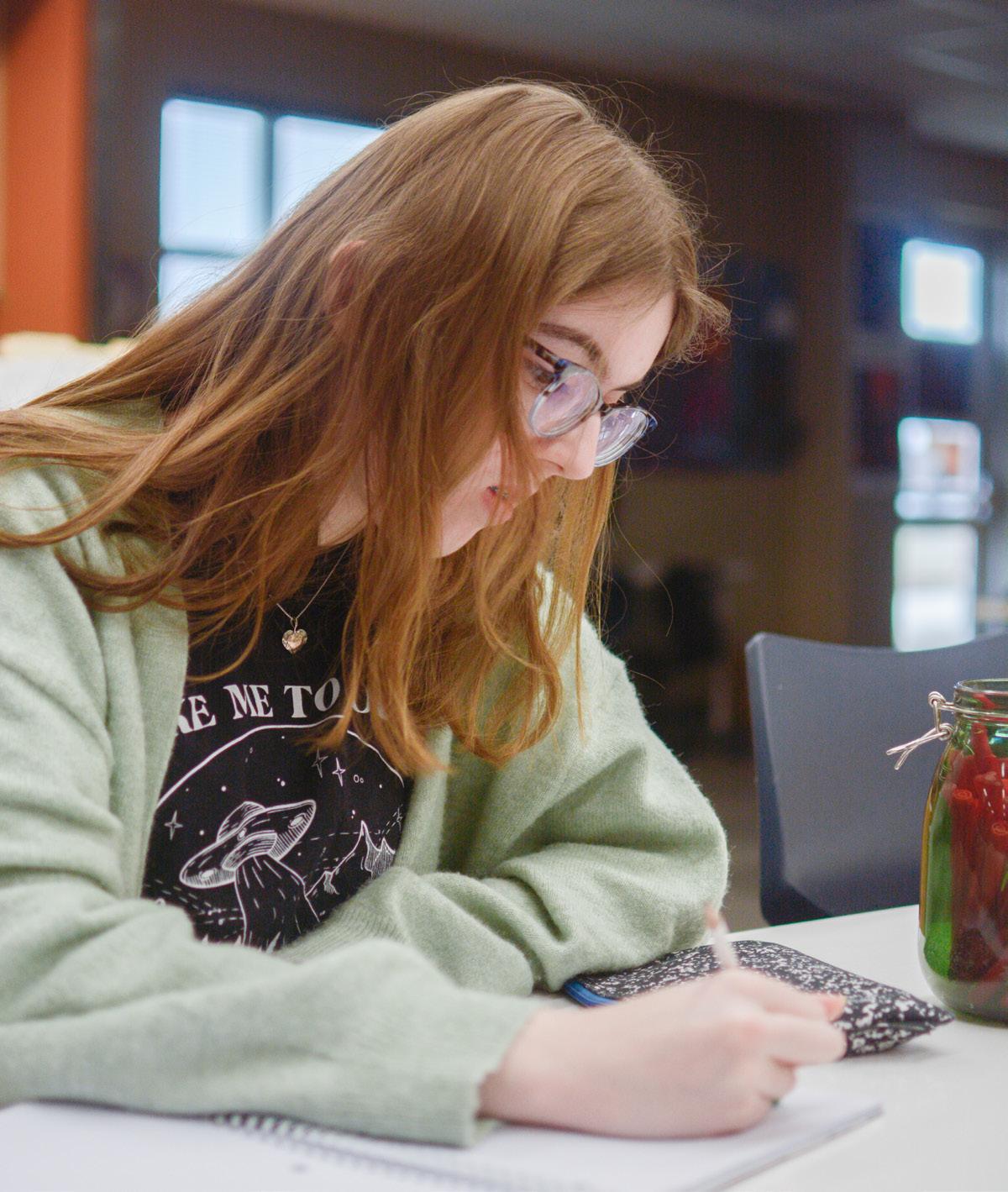
The Scholastic art and writing awards recognize student talent in categories such as art, drawing, poetry, journalism and many more.
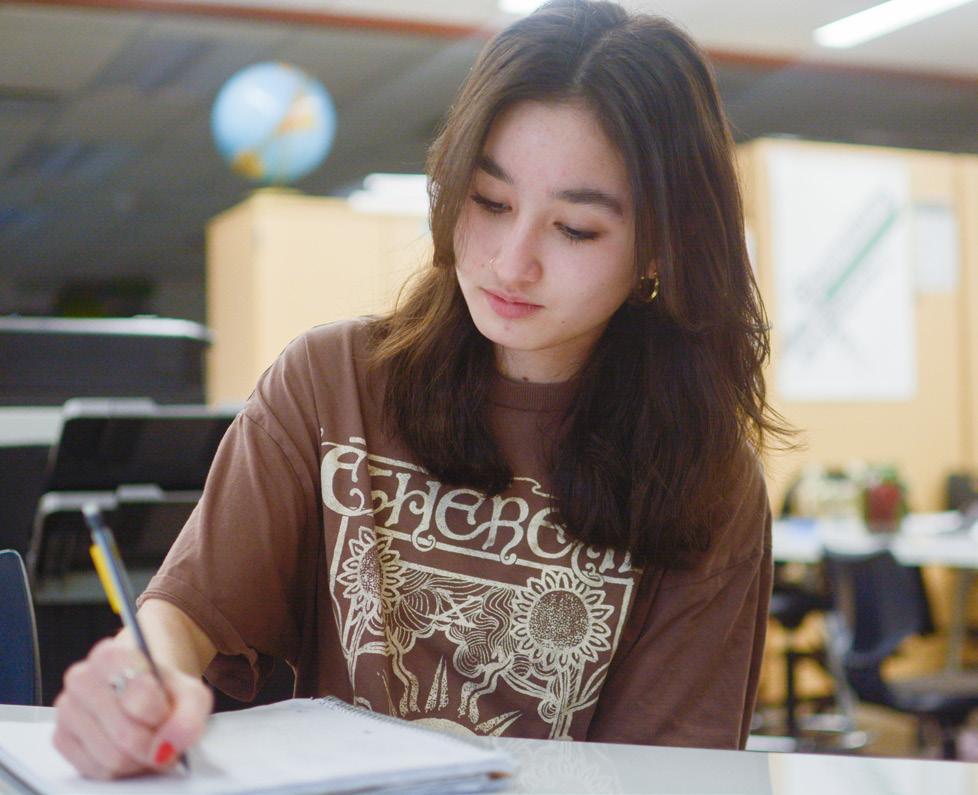
The Gold Key award signals first place at the regional level. It automatically qualifies Sellet as a consideration for a national award, which could provide scholarships along with cash prizes.
Sellet’s poem explained humanity’s relationship with language and how it affects personal relationships, while her short story was a post-apocalyptic story about a little girl whose guardian died and how she deals with that grief.
Many other students attended the Scholastic contest including junior Cooper Stone and sophomore Anwen Williams. Stone received honorable mention in the short story category with his story “Perfect Willow,” and Williams received honorable mention in the poetry category.
Stone’s short story explains the negative effects of striving to be perfect. Stone wanted to express a message that was meaningful in today’s society.
Williams’s poem was about mental health and growing as time passes. She wanted to spread a clear message to those affected.
All gold key winners for each category were nominees for a national award. The Scholastic National award winners were announced Mar. 22.
27
Design by Katie Campbell | Photos by Hannah Stone, Chloe Cook
“It was sort of surreal,” Sellet said. “I definitely wasn’t expecting both pieces to win at all, so it took a few minutes to sink in and then I was really excited.”
Sophomore Anwen Williams drafts a poem in her notebook. Williams recently won an Honorable Mention award for her poem Carnival Game in a regional writing contest. When asked how she felt about receiving this award, Williams said this. “It was really cool to get an honorable mention, I was pretty happy about it,” Williams said. Photo by Chloe Cook
Sophomore Gillian Sellet writes about her award winning poem “Lingua Franca’’ that was awarded Gold Key in the Missouri Writing Region of the 2023 Scholastic Writing Contest Photo by Chloe Cook
THE GREAT BURGER HEIST
Cafeteria reports 500 missing burgers
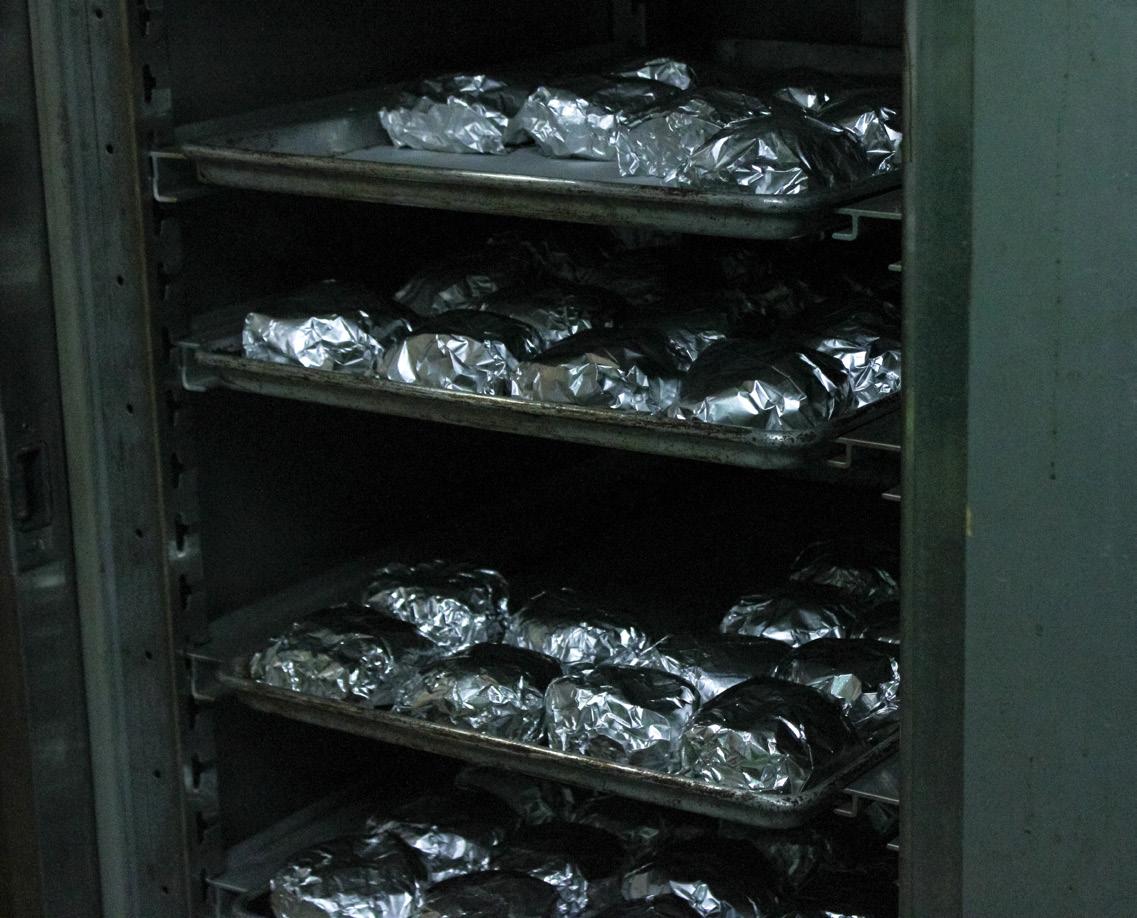
Once they get to the register the cashier gives them a ticket, they take the ticket to the cashier by the door, who then gives them the sandwich they want.
Director of nutrition and wellness at the USD 497 district, Julie Henry explained that since the cafeteria is losing so much money they will soon have to cut meals.
“Generally, the best meals are the most expensive to produce,” Henry said. “When we are losing money, those are going to be the first meals that get taken off the menuwhich isn’t what we want.”
Henry said that because of the poor decisions of a few students, efficiency in the cafeteria has come to a halt, and it’s ruining student’s lunch experience.
Since the beginning of the school year, students have been stealing burgers from the cafeteria by sneaking them in their pockets. It wasn’t till early October that cafeteria manager Tracy Pobjoy realized the extent of what had been stolen.
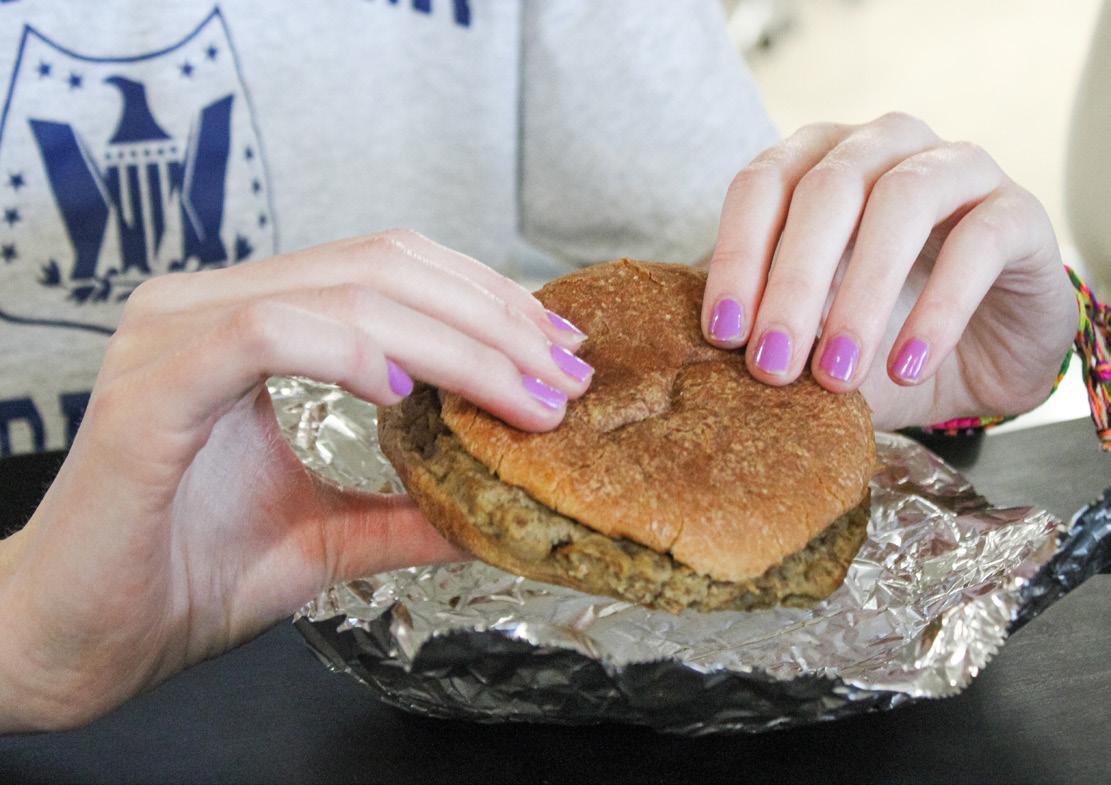
According to Pobjoy the school was losing 40-70 burgers a day, which resulted in the food service program losing $86.00 to $150.50 a day. At the rate burgers were being stolen, the school would lose $15,000 to $27,000 a school year.
“This sort of loss makes it more difficult to improve meal quality, impacts staff hiring and keeps the kitchen from being able to buy new supplies and equipment,” Pobjoy said.
This is not the first time the cafeteria has dealt with thievery, in the past the cafeteria staff noticed students stealing drinks, so in response the staff moved the drinks up to the register.
The cafeteria staff has installed a ticket system to prevent students from stealing. Now students have to go through a line to get everything except for a main dish.
“Since we have had to put these extra measures into effect, it slows down the lunch line,” Henry said. “This gives students less time to eat and socialize.”
Although students have less time to socialize, there is a benefit, now all students are able to have a burger at lunch. Before, students who had last lunch didn’t have the same access due to students stealing.
The Free Press - Feature 28
Hidden in the lunchroom, the variety of sandwiches are now being handed out separately to students through tickets. These burgers are now being watched by lunch ladies through all lunch periods. Photo by Riley Williams
Story by Grey Heiman
Freshman Emily Ahern said she is confused as to why students are robbing burgers and what they are doing with them. “Nobody thinks it is funny,” Ahern said. “I just think a lot of people are confused” Ahern said. Photo by Riley Williams.
REPORTS OF VANDALISM OF LOCAL BUSINESS
An increase in vandalism could cause problems for open lunch and students
During every lunch period, a number of students leave the school and get lunch and return without issue. However, administration has reported that students have caused harm to surrounding businesses during open lunch.
“We’ve had calls from Sprouts, Walmart, Taco Bell and Starbucks,” Principal Amy McAnarney said. “Sometimes the businesses will call the police patrol, so there are multiple ways that we found out.”
The staff of these businesses have to clean up the messes caused by this behavior, but also make sure these students aren’t damaging other customers’ property.
“I catch kids trying to throw carts at cars,” Sprouts Head Cashier Desiree Duran said. “Stealing has been one of the big issues.”
These events have caused general disarray within the store’s management, leading to more labor to remedy the situation.
Story by Tommy Taylor
“It’s a big issue because inventory has been affected,” Duran said. “Now our management has to take time out of their schedule to be up here, making sure that kids aren’t stealing.”
Not only does the behavior of these students lead to repercussions at school, but it also puts them at risk of legal action. Students are not afforded the same leniency as they are on campus.
“You’re not as protected as you are on campus,” School Resource Officer Kacey Wiltz said. “You can face criminal charges such as theft, criminal damage or possession of whatever you’re smoking. There are no rules,”
This behavior has opened conversations among administration about open lunch policies. If the behavior continues at its current rate, administration has discussed closing campus for lunch.
“It always could be a possibility,” Mcanarney said. “I hope that students understand these concerns and change their behavior when they go out for lunch so we continue to have [open lunches].”
29
Design by Vivi Riffel | Photos by Keat Hockenbury, Riley Williams
SPRING PHOTO RECAP
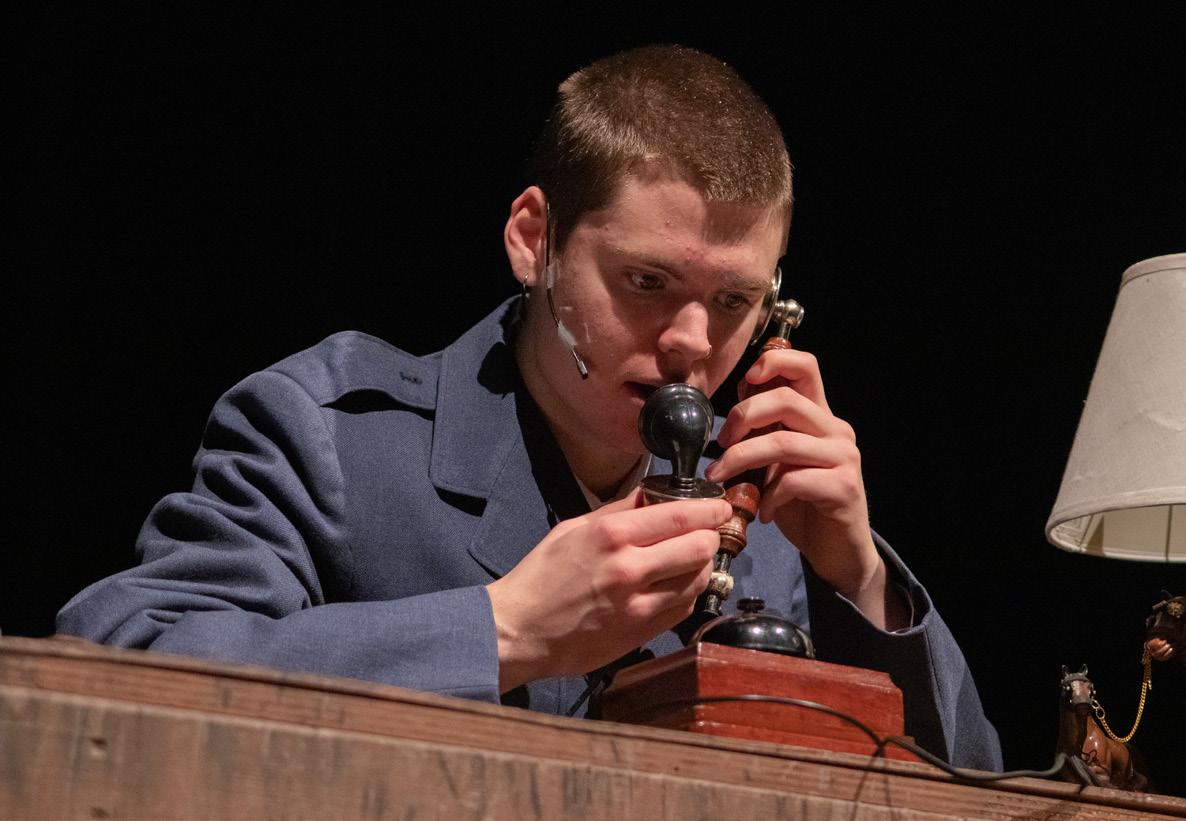
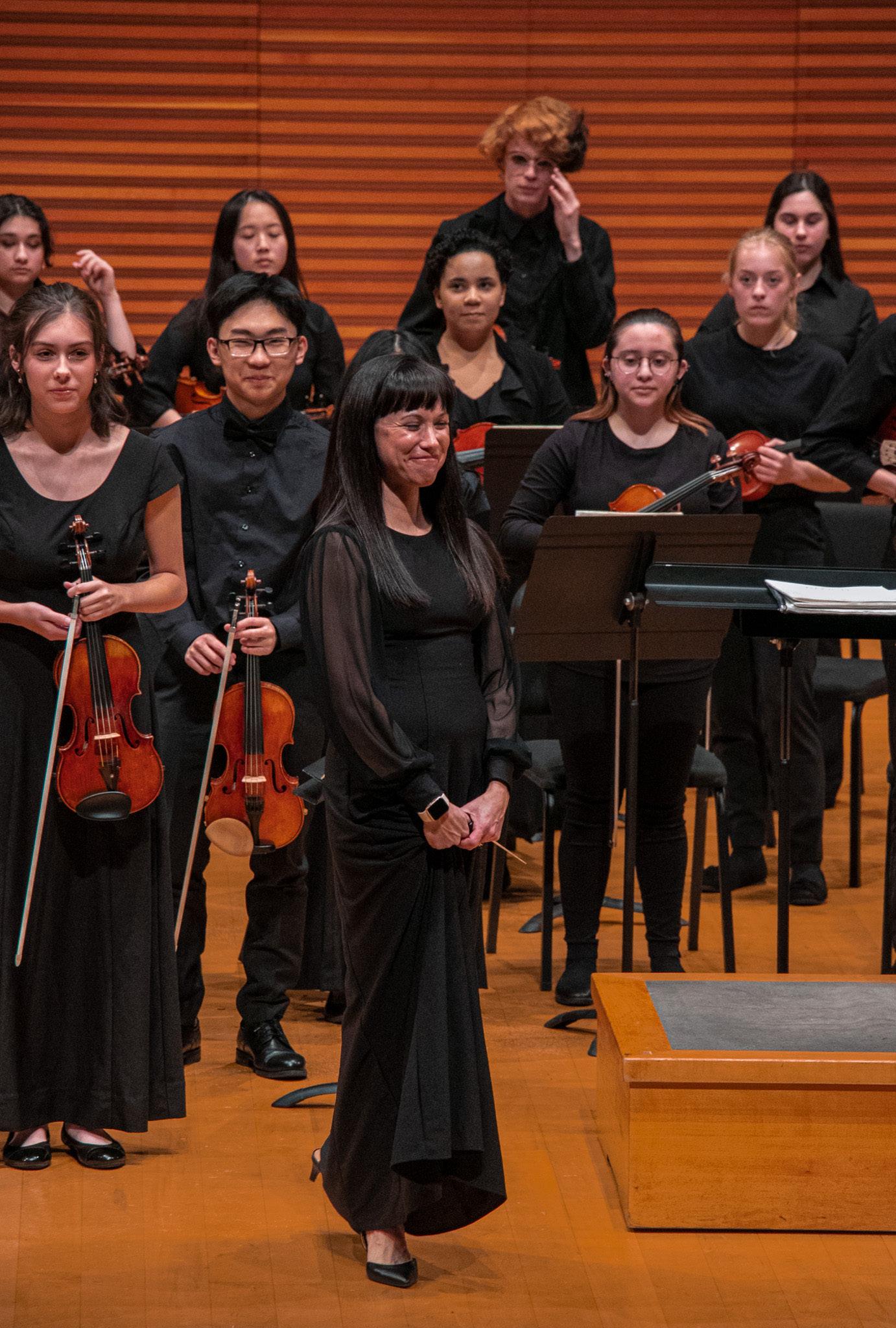
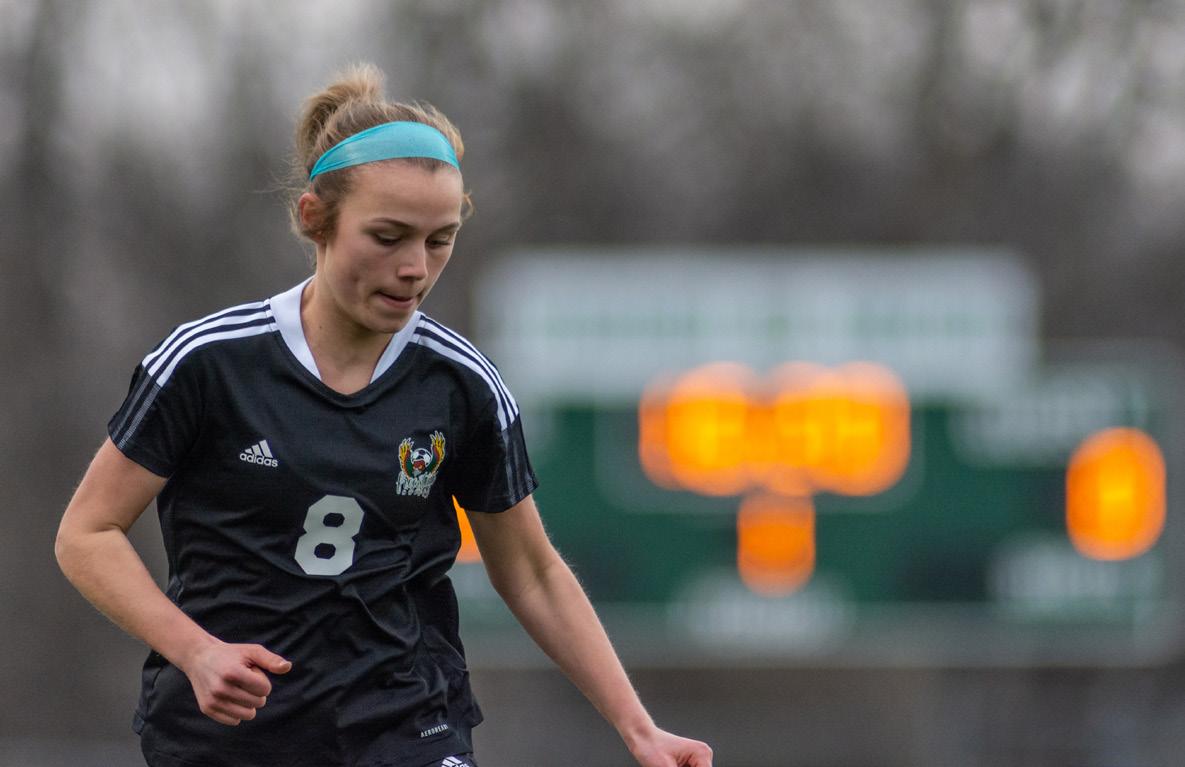


The Free Press - Photo Gallery & Ads 30

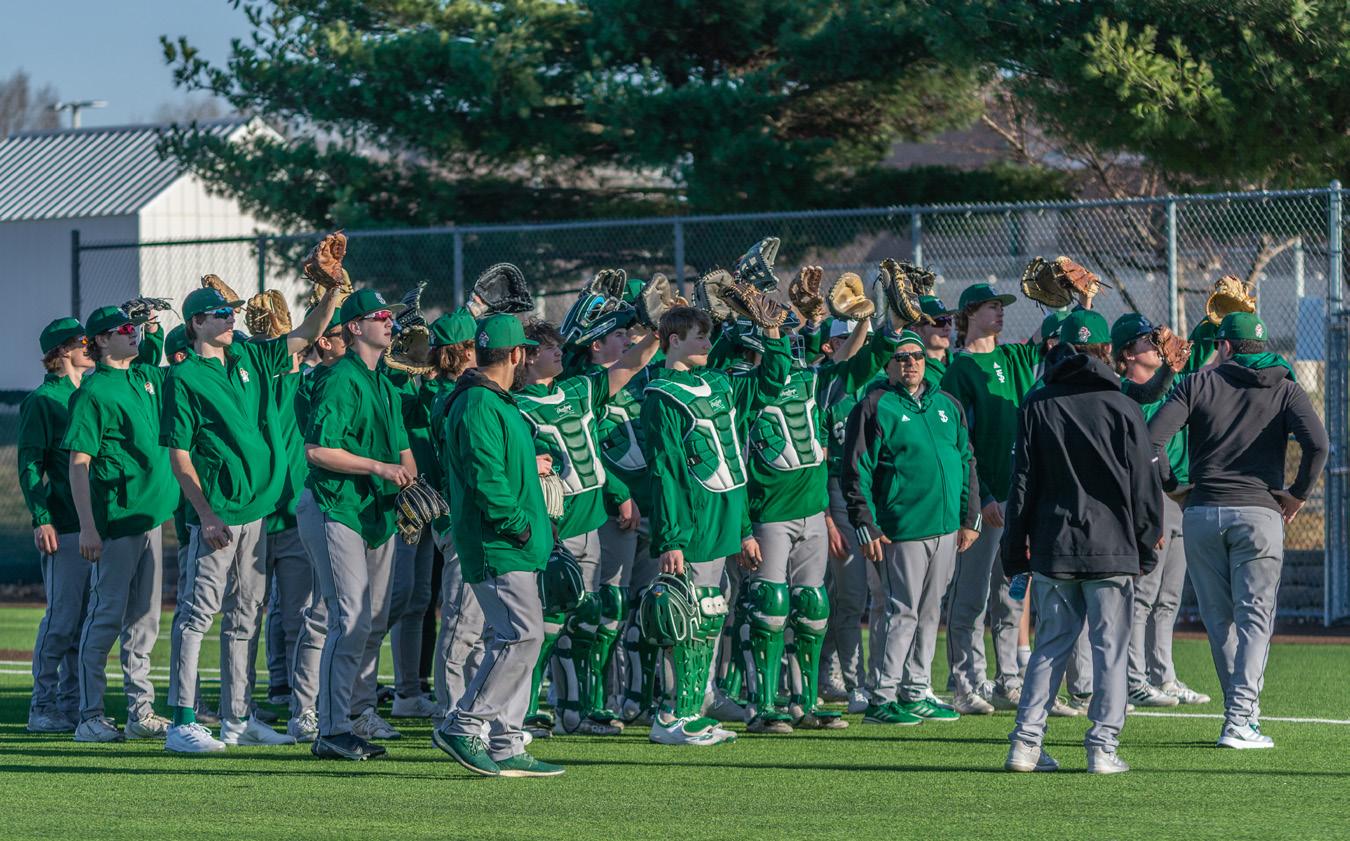
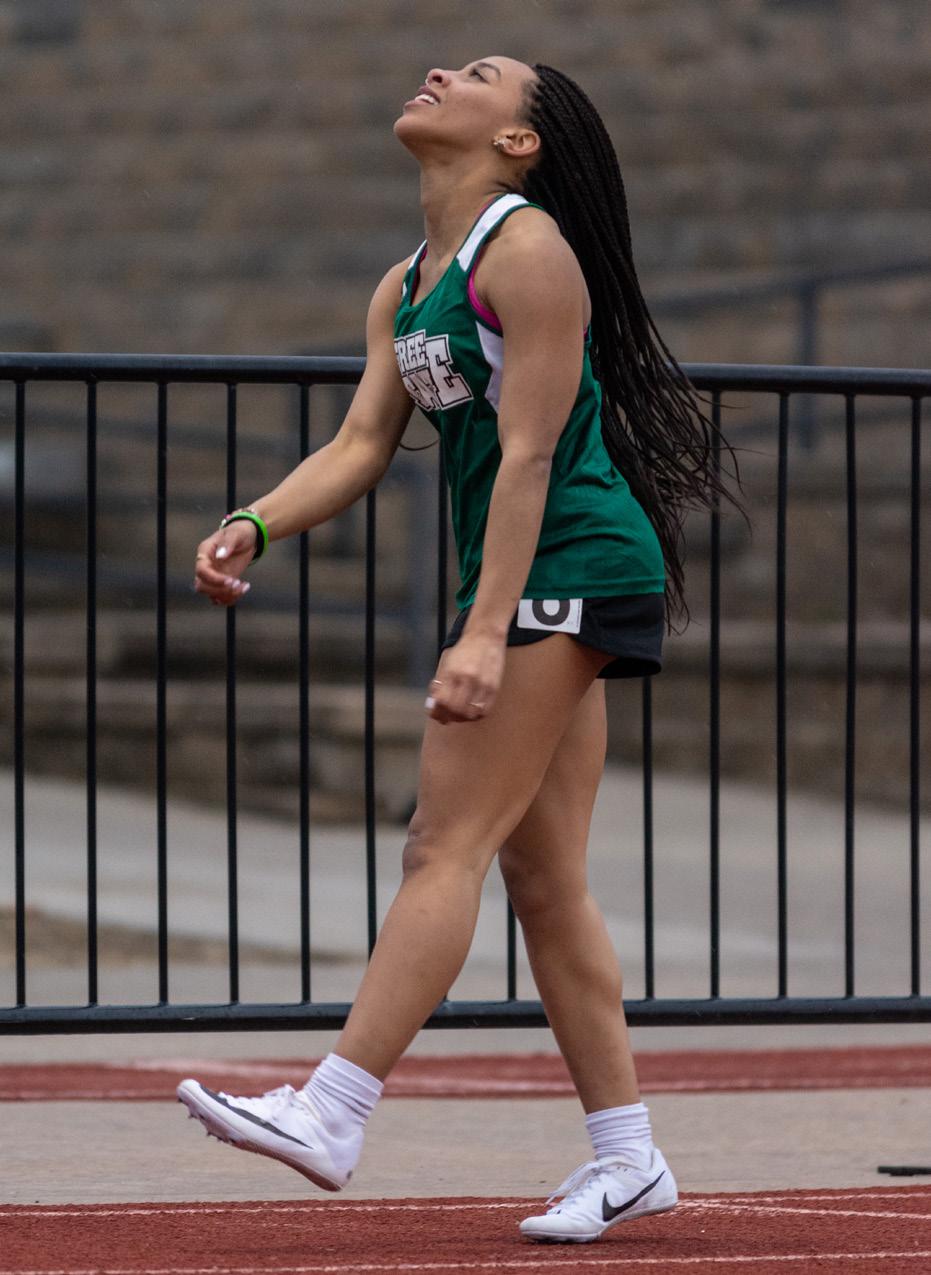

31
Design by Maile Hickman | Photos by Chloe Cook, Eleanor Roust, Mallory Thompson, Lady Ortega Perez
Coffee Shop Bracket







espresso
Designed by Sarah Masterson











 STUDENT POSES with a transgender flag during a student-organized walkout. Students from across the district walked out from class on March 28 to voice their opinions on the introduction of anti-trans bills in Kansas.
STUDENT POSES with a transgender flag during a student-organized walkout. Students from across the district walked out from class on March 28 to voice their opinions on the introduction of anti-trans bills in Kansas.

































 Story by Stella Mosier
Story by Stella Mosier












































